#context analysis
Text
Grasping Everyday Leadership: More Than Just Being in Charge
Leadership is a multifaceted domain with countless approaches, theories, and styles. In our previous posts about leadership, we’ve explored various dimensions of this intriguing subject. Today, we’re taking a deeper dive into an often under-appreciated aspect: the context in which leadership occurs. Welcome to the world of contextual leadership. Before we delve into the nitty-gritty, let’s start…
View On WordPress
#Adaptive Leadership#Business Strategy#Context Analysis#Contextual Leadership#continuous learning#Emotional Intelligence#Individual Differences#leadership#Leadership Challenges#Leadership Styles#Leadership Theory#Management#Organizational Culture#Team Dynamics#Versatility
0 notes
Text
Laios, Monsters, & Toshiro: On Racialized Desire and Identification with the Other
Arguably, the most significant part of Laios' character is the societal ostracization he faces because of his non-normative interests and behavior. For the majority of his life, Laios struggles socially, and other humans mistreat him. When he rescues Marcille from the Nightmares, his nightmare dredges up his inability to fit into school and the army. During his early dungeoneering days, he's lied to and exploited by his fellow party members.

One of his earliest and most formative negative experiences with people is his village's abuse of Falin as a magic user. He shares that after the villagers discovered that she can use magic, "adults who were just kind yesterday, all began to bully [her]." Instead of protecting Falin, his parent tell her to leave the village. The prejudice Falin faces and his parents' response to it upsets Laios to the point that he leaves home.

While Laios cares about his friends, the Demon points out that Laios understandably does not care for people in general. Laios doesn't disagree with the Demon's assessment and suspects that the Demon "can sense all [his] thoughts." The Demon goes on to say that Laios actually "despise[s] all humans." Laios denies this assessment, but given the Demon's uncanny ability to sniff out people's desires and Laios' ashamed expression, at least part of Laios likely agrees with the Demon. It's not a stretch to assume that he's held onto some hurt and resentment towards humans due to their mistreatment of him and Falin in their youth.

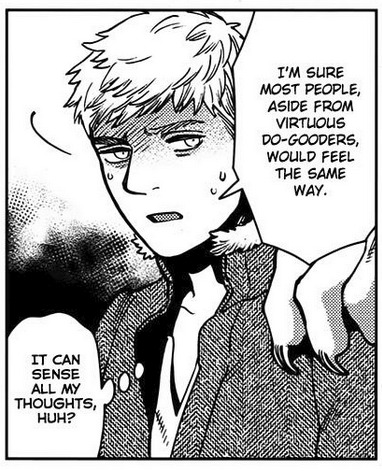
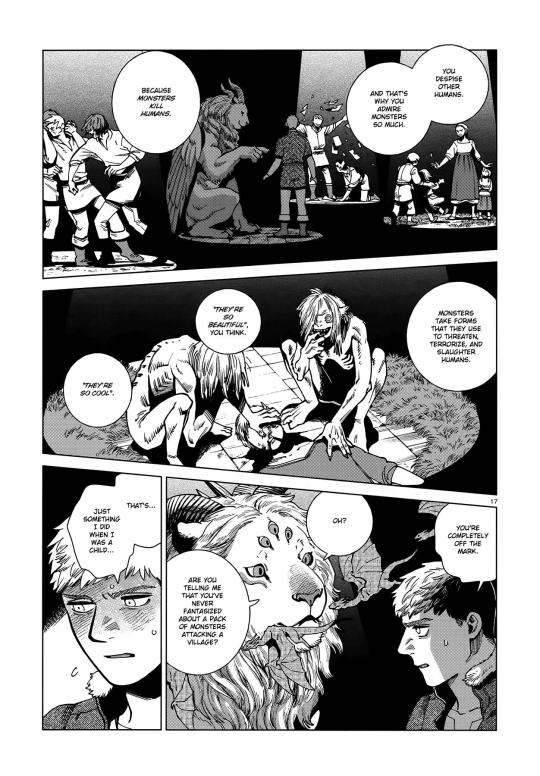
In response to how human society has othered him, Laios distances himself from humans and invests his time and energy into monsters and demi-humans instead. In the DunMeshi world, monsters and demi-humans are the ultimate societal Other. People fear them, exploit them, and even hunt and kill them. As someone who's similarly been mistreated by human society, Laios resonates deeply with monsters.
His desire to become a monster and/or beastman reflects his desire to reclaim agency over how society has ostracized him. If he chooses to become a monster, he gets to place value on what society has deemed despicable. He gets to choose why society hates him and be different on his own terms.
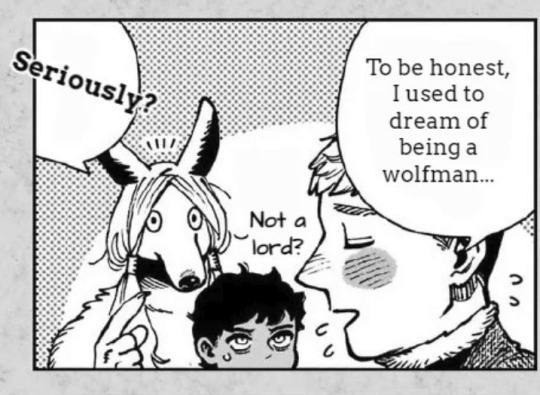
Both textually and thematically, Laios' identification with the Other bleeds into the erotic. More blatantly, he says that he'd have sex with orc women, and his succubus is a monstrous version of Marcille.


The entire story is also steeped in the theme of consumption as carnality. Laios and his party spend the entire manga eating monsters — a taboo physical act which they reap pleasure from; the underlying eroticism isn't difficult to see.
The story also presents consumption as a form of extreme identification. Eating a monster makes the monster part of you through digestion. The line between consuming the monster and becoming the monster — between erotic desire for the monster, demonstrated by eating their flesh, and identifying with the monster — is very blurred. Note that digesting a monster is an act of absorption; it destroys the original creature. Senshi states that consuming a monster erases "its individual identity," and major manga spoilers, but Laios defeats and pacifies the Demon by consuming its desire to eat. We'll come back to this concept later.
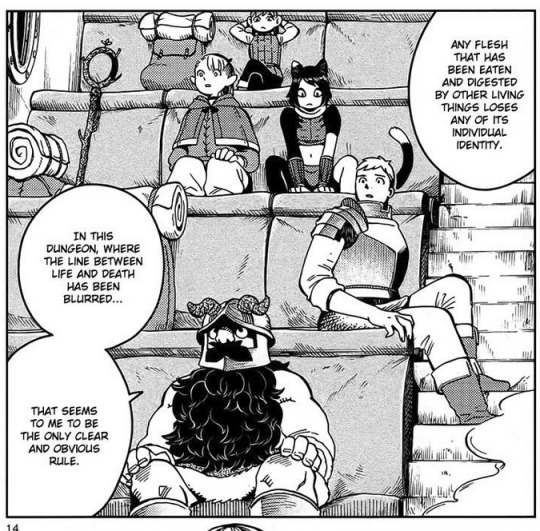
As previously mentioned, Laios is disinterested in most humans. The notable exception to this rule is Toshiro and by extension, the Eastern Archipelago. Laios doesn't seem to know much about the Archipelago before speaking to Toshiro, so he isn't drawn to Toshiro because he's an Easterner. Instead, he's drawn to his "odd appearance."
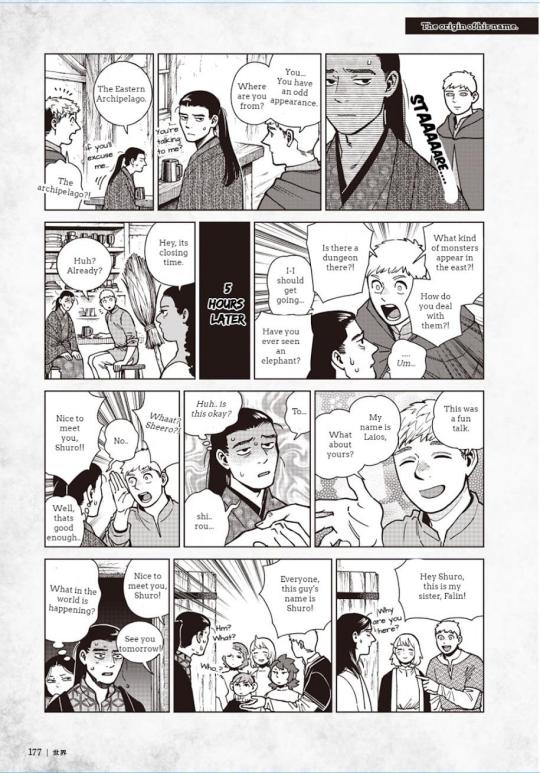
Just like Laios views monsters and demi-humans as a visible Other, Laios views Toshiro as another visible Other. On the Island, Toshiro stands out as a foreigner at first glance. While Laios as a white tallman doesn't appear visibly strange to other people, he's drawn again and again to people and creatures who are immediately visibly "odd." He sees them as understanding what it's like to be different and be mistreated for it, and since he relates to that experience, he wants to learn about them and be closer to them.
Essentially, Laios behaves towards Toshiro and his culture the same way he behaves towards monsters; he wants to know everything about Toshiro's foreign culture — the thing which makes him different. Unintentionally, Laios unintentionally reduces Toshiro to being Japanese; if he wasn't Japanese, Laios would never have approached him.
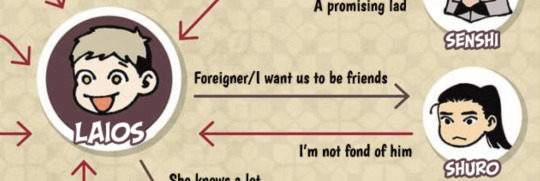
While Laios doesn't have bad intentions, as Toshiro himself acknowledges during their fight, his behavior towards Toshiro still has negative consequences. Laios' harmless interest in monsters translates to fetishization in the context of Japanese culture. He enacts multiple microaggressions against Toshiro and crossing his boundaries.
Laios goes beyond merely learning about Japanese culture. He takes parts of it for himself when he names his sword a Japanese name. Akin to his consumption of monsters, Laios attempts to participate in Toshiro's culture while failing to respect Toshiro himself. Just as eating monsters destroys them, Laios consuming Toshiro's culture while enacting racism against him causes real harm.
Many people have already written about Laios' microaggressions towards Toshiro, but a couple include Laios telling Toshiro that he looks "odd" and asking where he's from, mispronouncing his name as "Shuro," and assuming his favorite food is rice. Laios' treatment and fetishization of Toshiro is racist and harmful. However, I'd like to dive beyond the surface of Laios' micro-aggressive remarks and examine how his obsession with Toshiro becomes a racialized mode of desire, paralleling real world phenomena.
Though no concrete canonical evidence of Laios' feelings towards Toshiro being romantic and/or sexual exists, his interactions with Toshiro have erotic undertones. Their fight dialogue, in particular, revolves around eating, an act the story consistently shows as carnal. During this fight, Laios places his thumb in Toshiro's mouth and asks him, "What's the point of even having a mouth?" Laios' penetration of Toshiro's body via his mouth and his question's potential as an innuendo lend themselves to an erotic reading of the scene's more obvious conflict. Considering the overlap between consumption and carnality throughout the story, it's not a large jump to read eroticism into Laios demanding Toshiro meet his body's physical needs.

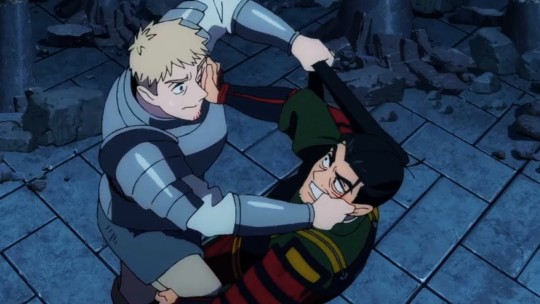
Furthermore, Laios is more enthusiastic about Toshiro than any other human in the series. While he cares deeply about his sister and his friends, Laios repeatedly expresses how much he admires Toshiro. He retains and brings up things like Toshiro's (perceived) favorite food. He wants to go to the East in Falin's place after she rejects Toshiro's marriage proposal, and in the "What-If" extra material, he's adamant about setting up a scenario where Toshiro travels with him through the Dungeon.

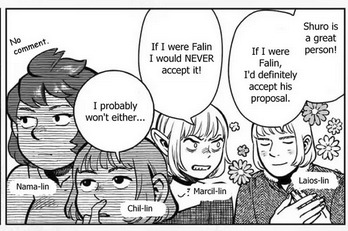

Undoubtedly, Laios is drawn to Toshiro. Since he sees non-white-ness and monstrosity as equivalent markers of societal othering, Toshiro's identity as a foreigner is what cultivates and maintains Laios' interest in him. Even if Laios learns to care for Toshiro as a person, his desire for Toshiro, platonically or otherwise, is still filtered heavily through race within the narrative.
Laios' relationship with his masculinity is also fraught. He broke off his engagement with a girl from his village and doesn't express normative interest in female tallmen. Seeing how the nightmare versions of his parents ask him when he's going to give them grandchildren, Laios experiences societal pressure to conform to a normative performance of masculinity through being attracted to and marrying a tallman woman and creating a family with her.
Laios frequently talks about how cool and admirable Toshiro is when he performs masculinity through combat, etc. He might find Toshiro's Asian masculinity more appealing and more accessible to him than the masculinity that's been forced onto him, precisely because Toshiro's Asian masculinity appears non-normative in a Western lens. But co-opting the masculinities of men of color as a white man would only further feed into the white consumption of cultures of color.
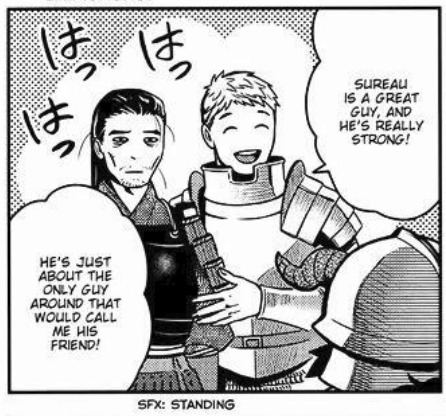
Overall, Laios' entitlement to and consumption of Toshiro's culture mirrors the real-life way white people co-opt and fetishize non-white cultures. Laios' fetishistic treatment of Japanese culture, because of his attraction (platonic or otherwise) to Toshiro, parallels white people's treatment of Asian people in the Western diaspora. I can only speak on the Asian American experience, but Laios immediately being drawn to Toshiro's "odd appearance," obsessing over his culture, and primarily treating Toshiro as a conduit for his said culture feels eerily close to how some white anime and/or K-pop fans act towards Japanese and Korean people.
Similarly to Laios, real queer, neurodivergent, and/or otherwise non-normative white people are marginalized by white Western society. They relate to how society others non-white cultures and/or people of color and latch onto them. While forming human connections based on curiosity and shared experiences is wonderful, white people are often unaware of the racial dynamics at play when they engage with non-white cultures and people of color and unintentionally, end up consuming and fetishizing non-white cultures in detrimental ways.
None of this negates the reality that Laios and Toshiro canonically care for each other. For instance, Toshiro's willingness to hug Laios reveals his genuine familiarity with and affection for him. The racial dynamics of their friendship complicate their relationship in fascinating ways and open up a potential path for Laios' growth. With time and effort, Laios could absolutely unlearn his racism and become a much better friend to Toshiro.
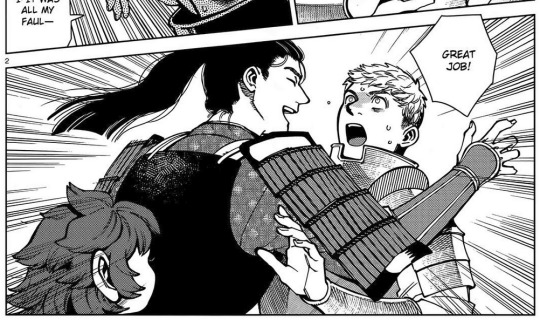
In conclusion, Laios' behavior towards Toshiro is a study in a marginalized white person's identification with and racialized desire for a non-white Other and how even a well-intentioned attempt at connection can replicate harmful racist dynamics. Toshiro's experience with Laios closely parallels real Asian people's struggles with racism and fetishization in our world today.
#laios touden#toshiro nakamoto#shuro#dungeon meshi#dunmeshi meta#dunmeshi analysis#i didn't want this to be superrr long but laios' treatment of the orcs is similar to his treatment of toshiro#he takes their cultural practices out of context and appropriates them (i.e. him wearing spoils of war when he declares himself king)#frankly him wanting to be an orc/wanting to sleep w orc women/appropriating their culture#and blurring the lines between identification/desire/consumption is even more clear than w toshiro#ryoko kui has a lot of interesting racial commentary in her work#but also she kinda flops on her depictions of black and brown ppl#anyw all very interesting to examine#i love u themes of consumption and desire and identity and borderline cannibalism#dunmeshi#delicious in dungeon#*mine#*meta
200 notes
·
View notes
Text
something that irks me so bad are those people who argue that the red dragon fight is when the REAL dungeon meshi starts. like all that character establishment and worldbuilding and relationship development from the first 11 episodes are all skippable, and the only important thing about them is that they litter a bit of context for the viewer. but once you get to episode 12 is when you REALLY need to lock in.
and i just. vehemently disagree with that sentiment so much. the death of filler has tragically ruined the way we engage with media. because why the FUCK would i care about the red dragon fight if i didn’t already love the characters and appreciate their motivation for the fight in the first place? like yea, laios wanting to save his sister and marcille wanting to save her best friend are fine motivations on paper, but i honestly wouldn’t give a shit about falin surviving if i did not watch those first 11 episodes of these characters’ painstaking determination to get her back.
the execution of it all was perfect because those expository episodes were also perfect. and we should not devalue them simply because the red dragon fight was the turning point/tone shift for the overall narrative.
#dungeon meshi#dunmeshi#delicious in dungeon#dungeon meshi analysis#just because an episode doesn’t contribute much to the overarching plot doesn’t mean it isn’t also important as hell!!!#like how impactful would zuko’s redemption arc be if we did not have the zuko alone (an arguably filler) episode?#we would not have the necessary context or attachment to his character to WANT him to redeem himself#anyway i digress#erros doesnt know how to shut up
329 notes
·
View notes
Text
I do think they kind of shot themselves in the foot when it comes to the events of Sonic Forces, not because they were bad ideas or even because they were poorly-executed, but because of how it necessitates a change in character dynamics that Sega isn't willing to let happen.
Sonic canon is now existing in a time where Eggman's succeeded in taking over most of the world before, along with imprisoning Sonic for, and I need to emphasize this every time I mention it, six months straight. If Sonic's going to be jokey and casual with Eggman after that, then we need to be able to tell that it's something of a front that he's putting up, or else the character continuity makes no sense.
Recall how, in Adventure 2, Sonic would mock Eggman a bit when he thought he had the upper hand with the fake Chaos Emerald, but not because he wasn't taking him seriously as a villain. He knew that the situation was tense, he was talking big just because that's his personality.
Also recall how he completely dropped the humor whenever things got really bad. Well, he's seen things get pretty much as bad as possible in Forces, all because of Eggman, and I just can't buy the casual nature of their interactions in Frontiers because of it. No matter how casually Sonic acts around him, it's gotta be clear that he doesn't feel comfortable with him. And as entertaining as their dialogue in Frontiers is due to that vibe, it's out of character at this point in the timeline.
Yes, Sonic was the same way with him during Forces. But Frontiers was fully willing to let Tails have more serious, grounded feelings about what happened in Forces, so why not Sonic?
And seriously, what's with this trend of letting literally everyone but Sonic experience residual effects of Forces? Tails shows lasting guilt/anxiety regarding Infinite's first attack in both the games and the comics. And in those comics, the Restoration is all about rebuilding the world after the war, pretty clearly being shaped by their experiences. Meanwhile, Sonic mentions his imprisonment exactly once, and it gets brushed aside immediately.
I understand that Sonic wouldn't want to talk about it, but at a certain point, he doesn't really need to. A shift in how seriously he takes Eggman as a threat, showing his distrust whenever possible, would easily be enough to get the point across. Maybe make a point about him being a little antsy in tight spaces or something (which is the same way Forces communicated the effects being captured had on him, by the way).
And honestly, Eggman should feel a little different, too. He's now someone who's come so close to complete world domination and still lost, I feel like we should be seeing... I dunno, something. A different edge to his hatred for Sonic after such a monumental failure, maybe. Anything to show that Forces mattered at all to the major players involved.
Like, I don't think I'm asking for much here. If we can shake up the status quo of the series by allowing Eggman to be an Actual Dad with a Child, we can allow Sonic and friends to treat him as a legitimate threat who can't be trusted. But nooo, Eggman has to be silly enough to continue the Brand Image, which means that Sonic doesn't even get to have retroactive character development like Tails did
#sonic the hedgehog#sonic forces#sonic frontiers#dr eggman#analysis#meta#Thought about this after rewatching some Frontiers cutscenes and realizing they were a little too. chummy#I'm not someone who dislikes seeing them portrayed that way but they GOTTA consider the context they're working with
232 notes
·
View notes
Text
Double Indemnity, Veritas Ratio and Aventurine

This was originally a part of my compilation post as a short analysis on the Double Indemnity references, linking to this great thread by Manya on Twitter. However, I've recently watched the movie and found that the parallels run much deeper than just the mission name and the light cone itself, plus as the short synopsis I've read online. Since there isn't really an in-depth attempt at an analysis on the film in relation to the way Aventurine and Ratio present themselves throughout Penacony, I thought I'd take a stab at doing just that. I will also be bringing up things from Manya's thread as well as another thread that has some extra points.
Disclaimer that I... don't do analyses very often. Or write, in general — I'm someone who likes to illustrate their thoughts (in the artistic sense) more than write. There's just something about these two that makes me want to rip into them so badly, so here we are. If there's anything you'd like to add or correct me on, feel free to let me know in the replies or reblogs, or asks. This ended up being a rather extensive deep dive into the movie and its influences on the pairing, so please keep that in mind when pressing Read More.
There are two distinct layers on display in Ratio and Aventurine's relationship throughout Penacony, which are references to the two most important relationships in the movie — where they act like they hate/don’t know each other, and where they trust each other.
SPOILER WARNING for the entire movie, by the way. You can watch the film for free here on archive.org, as well as follow along with the screenplay here. I will also be taking dialogue and such from the screenplay, and cite quotes from the original novel in its own dedicated section. SPOILER WARNING for the Cat Among Pigeons Trailblaze mission, as well.

CONTENT WARNING FOR MENTIONS OF SUICIDE. YOU HAVE BEEN WARNED.
To start, Double Indemnity (1944) is a film noir by Billy Wilder (and co-written by Raymond Chandler) based on the novel of the same name by James M. Cain (1927). There are stark differences between the movie adaptation and the original novel which I will get into later on in this post, albeit in a smaller section, as this analysis is mainly focused on the movie adaptation. I will talk about the basics (summaries for the movie and the game, specifically the Penacony mission in tandem with Ratio and Aventurine) before diving into the character and scene parallels, among other things.

—
[THE NAME]
The term "double indemnity" is a clause in which if there’s a case of accidental death of a statistically rare variety, the insurance company has to pay out multiple of the original amount. This excludes deaths by murder, suicide, gross negligence, and natural causes.

The part of the mission in Cat Among Pigeons where Ratio and Aventurine meet with Sunday is named after the movie. And before we get further into things, let's get this part out of the way: The Chinese name used in the mission is the CN title of the movie, so there's no liberties taken with the localization — this makes it clear that it’s a nod to the movie and not localization doing its own thing like with the mission name for Heaven Is A Place On Earth (EN) / This Side of Paradise (人间天堂) (CN).

—
[SUMMARY OF THE 1944 MOVIE]
Here I summarised the important parts that will eventually be relevant in the analysis related to the game.

Insurance salesman Walter Neff, wounded from a gunshot, enters his office and confesses his crime on a dictaphone to his boss Barton Keyes, the claims manager. Much earlier, he had met Phyllis Dietrichson, the wife of Mr. Dietrichson and former nurse. Neff had initially wanted to meet Mr. Dietrichson because of car insurance. Phyllis claims her husband is mean to her and that his life insurance goes to his daughter Lola. With Neff seduced by Phyllis, they eventually brew up a scheme to murder Mr. Dietrichson in such a way that they activate the "double indemnity" clause, and the plan goes off almost perfectly. Initially, the death is labeled a suicide by the president of the company, Norton.
Keyes finds the whole situation suspicious, and starts to suspect Phyllis may have had an accomplice. The label on the death goes from accidental, to suicide, to then murder. When it’s ruled that the husband had no idea of the accidental policy, the company refuses to pay. Neff befriends Phyllis’ stepdaughter Lola, and after finding out Phyllis may have played a part in the death of her father’s previous wife, Neff begins to fear for Lola and himself, as the life insurance would go all towards her, not Phyllis.
After the plan begins to unravel as a witness is found, it comes out that Lola’s boyfriend Nino Zachette has been visiting Phyllis every night after the murder. Neff goes to confront Phyllis, intending to kill her. Phyllis has her own plans, and ends up shooting him, but is unable to fire any more shots once she realises she did love him. Neff kills her in two shots. Soon after telling Zachette not to go inside the house, Neff drives to his office to record the confession. When Keyes arrives, Neff tells him he will go to Mexico, but he collapses before he could get out of the building.
—
[THE PENACONY MISSION TIMELINE]

I won’t be summarising the entirety of Aventurine and Ratio’s endeavours from the beginning of their relationship to their final conversation in Heaven Is A Place On Earth the same way as I summarised the plot of the movie, so I will instead present a timeline. Bolded parts means they are important and have clear parallels, and texts that are in [brackets] and italics stand for the names of either the light cone, or the mission names.
[Final Victor] Their first meeting. Ratio’s ideals are turned on its head as he finally meets his match.
Several missions happen in-between their first encounter and the Penacony project. They come to grow so close and trusting with each other that they can guess, understand each other’s thoughts, way of thinking and minds even in high stakes missions. Enough to pull off the Prisoner’s Dilemma (Aventurine’s E1) and Stag Hunt Game (Aventurine’s E6) and come out on top.
Aventurine turns towards Ratio for assisting him in the Penacony project. Ratio's involvement in the project is implied to be done without the knowledge of Jade, Topaz, and the IPC in general, as he was only sent to Penacony to represent the Intelligentsia Guild, and the two other Stonehearts never mention Ratio.
Aventurine and Ratio cook up the plan to deceive Sunday before ever setting foot on Penacony. Aventurine does not tell Ratio the entirety of his plan.
Aventurine convinces Topaz and Jade to trust him with their Cornerstones. Aventurine also breaks his own Cornerstone and hides it along with the jade within a bag of gift money.
[The Youth Who Chase Dreams] They enter Penacony in the Reverie Hotel. Aventurine is taken to the side by Sunday and has all his valuables taken, which includes the gift money that contains the broken aventurine stone, the jade, and the case containing the topaz.
Aventurine and Ratio speak in a “private” room about how Aventurine messed up the plan. After faking an argument to the all-seeing eyes of Sunday, Ratio leaves in a huff.
Ratio, wearing his alabaster head, is seen around Golden Hour in the (Dusk) Auction House by March 7th.
[Double Indemnity] Ratio meets up with Sunday and “exposes” Aventurine to him. Sunday buys his “betrayal”, and is now in possession of the topaz and jade. Note that this is in truth Ratio betraying Sunday all along.
Ratio meets up with Aventurine again at the bar. Ratio tells Aventurine Sunday wants to see him again.
They go to Dewlight Pavilion and solve a bunch of puzzles to prove their worth to Sunday.
They meet up with Sunday. Sunday forces Aventurine to tell the truth using his Harmony powers. Ratio cannot watch on. It ends with Aventurine taking the gift money with his Cornerstone.
[Heaven Is A Place On Earth] They are in Golden Hour. Ratio tries to pry Aventurine about his plan, but Aventurine reins him in to stop breaking character. Ratio gives him the Mundanite’s Insight before leaving. This is their final conversation before Aventurine’s grandest death.
Now how exactly does the word “double indemnity” relate to their mission in-game? What is their payout? For the IPC, this would be Penacony itself — Aventurine, as the IPC ambassador, handing in the Jade Cornerstone as well as orchestrating a huge show for everybody to witness his death, means the IPC have a reason to reclaim the former prison frontier. As for Ratio, his payout would be information on Penacony’s Stellaron, although whether or not this was actually something he sought out is debatable. And Aventurine? It’s highly implied that he seeks an audience with Diamond, and breaking the Aventurine Cornerstone is a one way trip to getting into hot water with Diamond. With Aventurine’s self-destructive behaviour, however, it would also make sense to say that death would be his potential payout, had he taken that path in the realm of IX.
Compared to the movie, the timeline happens in reverse and opposite in some aspects. I will get into it later. As for the intended parallels, these are pretty clear and cut:
Veritas Ratio - Walter Neff
Aventurine - Phyllis Dietrichson
Sunday - Mr. Dietrichson

There is one other character who I feel also is represented in Ratio, but I won’t bring them up until later down the line.
For the sake of this analysis, I won’t be exploring Sunday’s parallel to Mr. Dietrichson, as there isn’t much on Dietrichson’s character in the first place in both the movie and the novel. He just kind of exists to be a bastard that is killed off at the halfway point. Plus, the analysis is specifically hyper focused on the other two.
—
[SO, WHAT’S THE PLAN?]
To make things less confusing in the long run whenever I mention the words “scheme” and “plan”, I will be going through the details of Phyllis and Neff’s scheme, and Aventurine and Ratio’s plan respectively. Anything that happens after either pair separate from another isn’t going to be included. Written in a way for the plans to have gone perfectly with no outside problems.

Phyllis and Neff —> Mr. Dietrichson
Goal: Activate the double indemnity clause by killing Mr. Dietrichson and making it look like a freak train accident
Payout: Twice or more of the face value of the life insurance ($100,000)
Main Actor: Walter Neff | Accomplice: Phyllis Dietrichson
During the entire time until the payout, Phyllis and Neff have to make sure to any outsiders that they look like complete strangers instead of lovers in an affair.
Step-by-step:
Neff convinces Mr. Dietrichson to sign the policy with the clause without him suspecting foul play, preferably with a third party to act as an alibi. This is done discreetly, making Mr. Dietrichson not read the policy closely and being told to just sign.
Neff and Phyllis talk to each other about small details through the phone (specified to be never at Phyllis’ own house and never when Neff was in his office) and in the marketplace only, to make their meetings look accidental. They shouldn’t be seen nor tracked together, after all.
Phyllis asks Mr. Dietrichson to take the train. She will be the one driving him to the train station.
On the night of the murder, after making sure his alibi is airtight, Neff sneaks into their residence and hides in their car in the second row seating, behind the front row passenger seat. He wears the same colour of clothes as Mr. Dietrichson.
Phyllis and Mr. Dietrichson get inside the car — Phyllis in the driver’s seat and Mr. Dietrichson in the passenger seat. Phyllis drives. On the way to the train station, she makes a detour into an alley. She honks the horn three times.
After the third honk, Neff breaks Mr. Dietrichson’s neck. The body is then hidden in the second row seating under a rug.
They drive to the train station. Phyllis helps Neff, now posing as Mr. Dietrichson, onto the train. The train leaves the station.
Neff makes it to the observation platform of the parlour car and drops onto the train tracks when nobody else is there.
Phyllis is at the dump beside the tracks. She makes the car blink twice as a signal.
The two drag Mr. Dietrichson’s corpse onto the tracks.
They leave.
When Phyllis eventually gets questioned by the insurance company, she pretends she has no idea what they are talking about and eventually storms off.
Phyllis and Neff continue to lay low until the insurance company pays out.
Profit!
Actual Result: The actual murder plan goes almost smoothly, with a bonus of Mr. Dietrichson having broken a leg. But with him not filing a claim for the broken leg, a witness at the observation platform, and Zachette visiting Phyllis every night after the murder, Keyes works out the murder scheme on his own, but pins the blame on Phyllis and Zachette, not Neff.

Now for Aventurine and Ratio. You can skip this section if you understand how deep their act goes, but to those who need a refresher, here’s a thorough explanation:
Aventurine and Ratio —> Sunday
Goal: Collect the aventurine stone without Sunday knowing, ruin the dream (and create the grandest death)
Payout: Penacony for the IPC, information on the Stellaron for Ratio, a meeting with Diamond / death for Aventurine
Main Actor: Aventurine | Accomplice: Veritas Ratio
From the moment they step onto Penacony, they are under Sunday’s ever present and watchful eyes. “Privacy” is a foreign word to The Family. They have to act like they don’t like each other’s company the entire time and feed Sunday information through indirect means so that the eventual “betrayal” by Ratio seems truthful to Sunday. Despite what it looks like, they are closer than one would ever think, and Ratio would never sell out a person purely for information.
Step-by-step:
After Sunday takes away the bag of gift money and box, Aventurine and Ratio talk in a room in the Reverie Hotel.
Aventurine establishes the Cornerstones’ importance, and how he lost the gift money and the case containing the Cornerstones to Sunday. Ratio turns to leave, saying “some idiot ruined everything”, meaning the Cornerstones were vital to their plan. (Note that Ratio is not wearing his alabaster head while saying it to said “idiot”.)
Aventurine then proceeds to downplay the importance of the Cornerstones, stating they are “nothing more than a few rocks” and “who cares if they are gone”. This lets Sunday know that something suspicious may be going on for him to act like it’s nothing, and the mention of multiple stones, and leaves him to look up what a Cornerstone is to the Ten Stonehearts of the IPC.
Ratio points out his absurd choice of outfit, mentioning the Attini Peacock and their song.
Ratio implies that without the aventurine stone, he is useless to the IPC. He also establishes that Aventurine is from Sigonia(-IV), and points out the mark on his neck. To Sunday, this means that Aventurine is shackled to the IPC, and how Aventurine may possibly go through extreme lengths to get the stone back, because a death sentence always looms above him.
Aventurine claims Ratio had done his homework on his background, which can be taken that this is their very first time working together. (It isn’t, and it only takes one look to know that Aventurine is an Avgin because of his unique eyes, so this comment does not make sense even in a “sincere” way, a running theme for the interaction.)
Ratio mentions how the true goal is to reclaim Penacony for the IPC, establishing their ulterior motive for attending the banquet.
Ratio asks if Aventurine went to pre-school in Sigonia after saying trust was reliant on cooperation. Aventurine mentions how he didn’t go to school and how he doesn’t have any parents. He even brings up how friends are weapons of the Avgins. This tells Sunday that the Avgins supposedly are good at manipulation and potentially sees Ratio possibly betraying Aventurine due to his carelessness with his “friends”. Sunday would also then research about the Avgins in general (and research about Sigonia-IV comes straight from the Intelligentsia Guild.)
Ratio goes to Dewlight Pavilion in Sunday’s Mansion and exposes a part of Aventurine’s “plan”. When being handed the suitcase, Ratio opens it up due to his apparent high status in the IPC. He tells Sunday that the Cornerstone in the suitcase is a topaz, not an aventurine, and that the real aventurine stone is in the bag of gift money. This is a double betrayal — on Aventurine (who knows) and Sunday (who doesn’t). Note that while Ratio is not officially an IPC member in name — the Intelligentsia Guild (which is run by the IPC head of the Technology Department Yabuli) frequently collaborates with the IPC. Either Aventurine had given him access to the box, or Ratio’s status in general is ambiguous enough for Sunday not to question him further. He then explains parts of Aventurine’s gamble to Sunday in order to sell the betrayal. Note that Ratio does not ever mention Aventurine’s race to Sunday.
Ratio brings Aventurine to Sunday. Aventurine offers help in the investigation of Robin's death, requesting the gift money and the box in return.
Sunday objects to the trade offer. Aventurine then asks for just the bag. A classic car insurance sales tactic. Sunday then interrogates Aventurine, and uses everything Ratio and Aventurine brought up in the Reverie Hotel conversation and their interactions in the Mansion, as well as aspects that Ratio had brought up to Sunday himself.
Aventurine feigns defeat and ignorance enough so that Sunday willingly lets him go with the gift bag. After all is said and done, Aventurine leaves with the gift money, where the Aventurine Cornerstone is stored all along.
Ratio and Aventurine continue to pretend they dislike each other until they go their separate ways for their respective goals and plans. Aventurine would go on to orchestrate his own demise at the hands of Acheron, and Ratio… lurks in the shadows like the owl he is.
Profit!
Actual Result: The plan goes perfectly, even with minor hiccups like Ratio coming close to breaking character several times and Aventurine being sentenced to execution by Sunday.
This is how Sunday uses the information he gathered against Aventurine:
• Sunday going on a tirade about the way Aventurine dresses and how he’s not one to take risks — Ratio’s comment about Aventurine’s outfit being peacock-esque and how he’s “short of a feather or two”.
• “Do you own a Cornerstone?” — Ratio talked about the aventurine stone.
• “Did you hand over the Cornerstone to The Family when you entered Penacony?” — Aventurine mentioned the box containing the Cornerstones.
• “Does the Cornerstone you handed over to The Family belong to you?” — Aventurine specifically pluralized the word Cornerstone and “a bunch of rocks” when talking to Ratio.
• “Is your Cornerstone in this room right now?” — The box in the room supposedly contained Aventurine’s own cornerstone, when Aventurine mentioned multiple stones.
• “Are you an Avgin from Sigonia?” —Aventurine mentioned that he’s an Avgin, and Ratio brought up Sigonia.
• “Do the Avgins have any ability to read, control, and manipulate one’s own or another’s minds?” — Aventurine’s comment on how friends are weapons, as well as Sunday’s own research on the Avgins, leading him to find out about the negative stereotypes associated with them.
• “Do you love your family more than yourself?” — His lost parents.
“All the Avgins were killed in a massacre. Am I right?” — Based on Sunday’s research into his background.
• “Are you your clan’s sole survivor?” — Same as the last point.
“Do you hate and wish to destroy this world with your own hands?” — Ratio mentioned the IPC’s goal to regain Penacony, and Aventurine’s whole shtick is “all or nothing”.
• “Can you swear that at this very moment, the aventurine stone is safe and sound in this box?” — Repeat.
As seen here, both duos have convoluted plans that involve the deception of one or more parties while also pretending that the relationship between each other isn’t as close as in reality. Unless you knew both of them personally and their histories, there was no way you could tell that they have something else going on.
On to the next point: Comparing Aventurine and Ratio with Phyllis and Neff.
—
[NEFF & PHYLLIS — RATIO & AVENTURINE]

With the short summaries of the movie and the mission out of the way, let’s look at Phyllis and Neff as characters and how Aventurine and Ratio are similar or opposite to them.

Starting off with Aventurine and Phyllis. Here is where they are the most similar:
Phyllis is blonde and described as a provocative woman. Aventurine is also a blond and eyes Ratio provocatively in the Final Victor light cone.
Phyllis was put under surveillance after Keyes starts figuring out that the so-called accidental death/suicide may have been a murder after all. Similarly, Aventurine was watched by Sunday the entire time in Penacony.
Phyllis never tells Neff how she's seeing another man on the side to possibly kill him too (as well as how she was responsible for the death of her husband‘s previous wife). Aventurine also didn't tell Ratio the entirety of his plan of his own death.
Phyllis puts on a somewhat helpless act at first but is incredibly capable of making things go her way, having everything seemingly wrapped around her finger. Aventurine — even when putting on a facade that masks his true motives — always comes out at the top.
Now the differences between Aventurine and Phyllis:
Phyllis does not care about her family and has no issue with killing her husband, his previous wife, and possibly her daughter Lola. Opposite of that, Aventurine is a family man… with no family left, as well as feeling an insane level of survivor’s guilt.
Really, Phyllis just… does not care at all about anyone but herself and the money. Aventurine, while he uses every trick in the book to get out on top, does care about the way Jade and Topaz had entrusted him with their Cornerstones, in spite of the stones being worth their lives.
Phyllis also uses other people to her advantage to get what she wants, often behind other people's backs, with the way she treats Neff and Zachette. Aventurine does as well (what with him making deals with the Trailblazer while also making a deal with Black Swan that involves the Trailblazer). The difference here is Phyllis uses her allure deliberately to seduce men while Aventurine simply uses others as pawns while also allowing others to do the same to himself.
Phyllis makes no attempt at compromising the policy when questioned by Norton. Aventurine ends up compromising by only taking the gift money (which is exactly what he needs).
The wig that Barbara Stanwyck (the actress of Phyllis) wore was chosen to make her look as “sleazy” as possible, make her look insincere and a fraud, a manipulator. A sort of cheapness. Aventurine’s flashy peacock-esque outfit can be sort of seen as something similar, except the outfit isn’t cheap.

Moving on to Ratio’s similarities to Neff… There isn’t much to extrapolate here as Ratio is more of a side character in the grand scheme of Penacony, however this is what I’ve figured out.
Neff has dark hair. Ratio has dark purple hair.
Neff almost never refers to Phyllis by her name when speaking with her, only as “baby”. The few times he refers to her as Phyllis or Mrs. Dietrichson is during their first conversations and when he has to act like he doesn’t know her. Ratio never calls Aventurine by his name when he’s around him — only as “gambler”, sometimes “damned” or “dear” (EN-only) gambler. Only in the Aventurine's Keeping Up With Star Rail episode does Ratio repeatedly say his name, and yet he still calls him by monikers like “gambler” or, bafflingly, a “system of chaos devoid of logic”.
Both Neff and Ratio committed two betrayals: Neff on Mr. Dietrichson and Keyes, and Ratio on Sunday and Aventurine. With the former cases it was to reach the end of the trolley line, and with the latter it was on a man who had put his trust in him.
As for the differences…
Neff is described as someone who’s not smart by his peers. Ratio is someone who is repeatedly idolised and put on a pedestal by other people.
Neff is excellent at pretending to not know nor care for Phyllis whenever he speaks about her with Keyes or when he and she are in a place that could land them in hot water (the office, the mansion when there are witnesses). His acting is on the same level as Phyllis. With Ratio it’s… complicated. While he does pull off the hater act well, he straight up isn’t great at pretending not to care about Aventurine’s wellbeing.
Instead of getting his gunshot wound treated in the hospital like a normal person, Neff makes the absolutely brilliant decision of driving to his office and talking to a dictaphone for hours. Needless to say, this is something a medical doctor like Ratio would never do.

Now here's the thing. Though it's very easy to just look at Phyllis and Neff in the movie and go "okay, Aventurine is Phyllis and Ratio is Neff — end of story" and leave it at that, I find that they both take from the two leads in different ways. Let me explain. Beginning with Aventurine and Neff…
Neff is the one who hatches the plan and encourages Phyllis to go through and claim the double indemnity clause in the first place. He is also the key player of his own risky plan, having to fake being the husband to enter the train as well as fake the death. Aventurine puts himself at great risk just by being in Sunday’s presence, and hoping that Sunday wouldn’t figure out that the green stone he had uncovered wasn’t the aventurine stone.
Adding onto the last point, Neff had fantasised about pulling off the perfect murder for a long time — the catalyst was simply him meeting Phyllis. Aventurine presumably sought out Ratio alone for his plan against Sunday.
Neff makes a roulette wheel analogy and talks about a pile of blue and yellow poker chips (the latter in the script only). I don‘t even have to explain why this is relevant here. (Aventurine’s Ultimate features a roulette wheel and the motif is on his belt, thigh strap, and back, too. And of course, Aventurine is all about his chips.)
Neff has certain ways to hide when he’s nervous, which include hiding his hands in his pockets when they were shaking, putting on glasses so people couldn’t see his eyes. Aventurine hides his left hand behind his back when he’s nervous: Future Aventurine says that "they don't know the other hand is below the table, clutching [his] chips for dear life", and in multiple occasions such as the Final Victor LC, his character trailer, and even in his boss form in the overworld you can see that Aventurine hides his left hand behind his back. And he is also seen with his glasses on sometimes.
Neff says a bunch of stuff to make sure that Phyllis acts her part and does not act out of character (i.e. during their interactions at the market), like how Aventurine repeatedly tries to get Ratio back on track from his subpar acting.
Neff is always one step ahead of the game, and the only reason the plan blows up in his face is due to outside forces that he could not have foreseen (a witness, Keyes figuring out the plan, the broken leg). Aventurine meanwhile plays 5D chess and even with the odds against him, he uses everything he can to come out on the top (i. e. getting Acheron to kill him in the dream).
Even after coming home on the night of the murder, Neff still felt that everything could have gone wrong. Aventurine, with his blessed luck, occasionally wavers and fears everything could go wrong whenever he takes a gamble.
Neff was not put under surveillance by Keyes due to him being extensive with his alibi. After witnessing Robin’s death with eyewitnesses at the scene, the Family had accepted Aventurine’s alibi, though he would be under watch from the Bloodhounds according to Ratio.
Neff talks about the entire murder scheme to the dictaphone. Aventurine during Cat Among Pigeons also retells his plan, albeit in a more convoluted manner, what with his future self and all.

Continuing with Ratio and Phyllis, even with their personalities and motivations being quite different, they do have a few commonalities.
Phyllis was a nurse. Ratio is a medical doctor.
Her name is Greek of origin. Veritas Ratio, though his name is Latin, has Greco-Roman influences throughout his entire character.
The very first scene Phyllis appears in has her wearing a bath towel around her torso. Ratio loves to take baths to clear his mind.
Phyllis was instructed by Neff to be at the market every morning at eleven buying things. Ratio is seen in an auction house with his alabaster head on so no one could recognize him.
Phyllis mostly acts as an accomplice to the scheme, being the one to convince her husband to take the train instead. She is also generally seen only when Neff is involved. Ratio plays the same role as well, only really appearing in the story in relation to Aventurine as well as being the accomplice in Aventurine’s own death. Even him standing in the auction house randomly can be explained by the theory that he and Aventurine had attempted to destabilise Penacony’s economy through a pump and dump scheme.
With these pointers out of the way, let’s take a closer look at select scenes from the film and their relation to the mission and the pair.
—
[THE PHONE CALL — THE REVERIE HOTEL]

Before the murder, there is a scene with a phone call between Phyllis and Neff discussing the plan while Keyes is in the same room as Neff. Neff has to make sure that Keyes doesn’t think of anything of the phone call, so he acts like he’s calling a “Margie”, and says a bunch of stuff that sounds innocent out of context (“Can’t I call you back, ‘Margie’?” “What color did you pick out?” “Navy blue. I like that fine”), but are actually hinting at the real plan all along (the suit that Mr. Dietrichson wears.)
In a roundabout way, the conversation between Ratio and Aventurine in the Reverie Hotel can be seen as the opposite of that scene — with the two talking about their supposed plan out loud on Penacony ground, a place where the Family (and in turn, Sunday) has eyes everywhere. Despite being in a “private” room, they still act like they hate each other while airing out details that really do not make sense to air out if they really did meet the first time in Penacony (which they didn’t — they’ve been on several missions beforehand). It’s almost like they want a secret third person to know what they were doing, instead of trying to be hushed up about it. The TVs in the room that Sunday can look through based on Inherently Unjust Destiny — A Moment Among The Stars, the Bloodhound statue that disappears upon being inspected, the owl clock on the left which side eyes Ratio and Aventurine, all point to that Sunday is watching their every move, listening to every word.
Rewinding back to before the phone call, in one of the encounters at the marketplace where they “accidentally” run into each other, Phyllis talks about how the trip was off. How her husband wouldn’t get on the train, which was vital for their plan, because of a broken leg. All this, while pretending to be strangers by the passersby. You could say that the part where Ratio almost leaves because Aventurine had “ruined the plan” is the opposite of this, as the husband breaking his leg was something they couldn’t account for, while Aventurine “being short of a few feathers” was entirely part of the plan.
—
[QUESTIONING PHYLLIS — THE INTERROGATION]

This section is going to be a little longer as I will cover two scenes in the movie in a more detailed manner — Mr. Dietrichson signing the policy, and Phyllis being questioned — and how they are represented in the Sunday-Aventurine interrogation and the prior conversation between Ratio and Sunday in multitudes of ways.
Going about their plan, Neff has to make sure that Mr. Dietrichson signs the policy with the double indemnity clause without him knowing the details, all the while having Phyllis (and Lola) in the same room. He and Phyllis have to pretend that they don’t know each other, and that this is just the standard accidental insurance process, instead of signing what would be his downfall. To sell it, he gets Mr. Dietrichson to sign two “copies” of the form, except with Mr. Dietrichson’s second signature, he’s duped into signing the accident insurance policy with the respective clause.
You can tie this to how Ratio goes to Sunday in order to “expose” the lie that the suitcase didn’t actually contain the Aventurine Cornerstone, as well as there being more than one Cornerstone involved in the scheme. Ratio must make sure that Sunday truly believes that he dislikes Aventurine’s company, while also making sure that Sunday doesn’t figure out the actual aventurine stone is broken and hidden in the gift bag. The scheme turns out to be successful, as Sunday retrieves the two Cornerstones, but not the aventurine stone, and truly does think that the green stone he has in his possession is the aventurine.

This whole scene with Sunday is also reminiscent of the interrogation scene in the middle of the movie, where Phyllis was questioned by the boss (Norton) who was deducing that Mr. Dietrichson's death was a suicide, not accidental death. Neff, Phyllis, Keyes and Norton were all in the same room, and Neff and Phyllis had to act like they never knew the other. Phyllis acts like she knows nothing about what Norton insinuates about her husband and eventually, Phyllis explodes in anger and storms out the room, even slamming the door. Her act is very believable to any outsider.

Now back to the Ratio and Sunday conversation. One glaring difference between the movie and here is that his acting isn’t great compared to either Phyllis nor Neff. It never was throughout the Penacony mission. He even comes very close to breaking character several times, and is even defending Aventurine in a somewhat aggressive manner during his one-on-one conversation with Sunday, as in he literally tells Sunday to see a shrink. It’s very different from the way he was acting in Herta Space Station — like Ratio cares about Aventurine too much to keep his hands off.
It's also worth pointing out that Neff doesn't speak a word when Phyllis was being interrogated. Similarly, Ratio is silent throughout the entire scene with Sunday and Aventurine, with his only “line” being a “hm”. When Aventurine calls him a wretch to his face, all he does is look to the side. In fact, he can only look at Aventurine when the other isn’t staring back. Almost like him uttering a single word would give them away. Or his acting is terrible when it has to do with Aventurine, as he has no issue doing the same thing in Crown of the Mundane and Divine (Mundane Troubles).
So, Sunday finds out about the Cornerstones and reveals them to Aventurine, and reasons that he cannot give them back to him because Aventurine had lied. Note that in that same scene, Aventurine attempted to use the two murders that had occurred beforehand against Sunday to retrieve his own cornerstone. Similarly, when it was revealed that Mr. Dietrichson did not know about the accident policy and that the so-called “accidental death” was not, in fact, accidental, the insurance company refused to pay out the money.
Unlike the movie, this was all planned, however. The double-crossing by Ratio, the gift money being the only thing required for Aventurine’s real plan. All of it was an act of betrayal against Sunday, in the same manner as the meticulous planning as Mr. Dietrichson’s murder — To sign the policy, get him to take the train, kill him on the way, and to have Neff pose as the husband on the train until the time is right to get off and lay the body on the tracks. A key difference is that they could not have expected their scheme to be busted wide open due to forces outside of their control, while Ratio and Aventurine went straight down the line for the both of them no matter what.
From here on out, we can conclude that the way Ratio and Aventurine present themselves in Penacony to onlookers is in line with Neff and Phyllis.
—
[“GOODBYE, BABY” — FINAL VICTOR]

And now for the (in)famous light cone, Final Victor. The thing that truly kickstarted the Ratio and Aventurine ship in the fanbase, and the partnership between the two in general. It’s a direct reference to the final confrontation between Neff and Phyllis in the movie.
I’ll fire through all the similarities between the two scenes.
During the respective scenes, Aventurine and Phyllis both outsmart their partner one way or the other: Aventurine with his one-sided game of Russian Roulette, and Phyllis hiding her gun underneath the cushions until Neff turned away.
The guns are owned by Phyllis and Aventurine, not Neff and Ratio.
Phyllis couldn’t bring herself to fire any more shots after she realised she truly did love Neff. Ratio could do nothing but watch as Aventurine did what he did — he couldn’t even pull away if the LC animation is anything to go by him struggling as Aventurine firmly keeps the gun to his chest.
Neff says he doesn’t buy (believe) that Phyllis loved him. She then goes “I’m not asking you to buy […]”. The LC description has Aventurine ask Ratio “You don’t believe me?”, while in the LC animation Ratio straight up says “You expect me to believe you?” and Aventurine answering “Why not, doctor/professor?”
The visual composition of the LC and the scene are nearly identical, from the lighting to the posing to the way Aventurine looks at Ratio — Aventurine and Ratio are even wearing different outfits to fit the scene better. The background in the LC is also like the blinders in the movie, just horizontal.
In the shot where Phyllis’ face is more visible, the way she looks at Neff is strikingly like the way provocatively looks at Ratio. Even their eyes have a visible shine — Phyllis’ eyes brightly shining the moment she realised she really fell in love with Neff, and Aventurine having just a little light return to his eyes in that specific moment.
And now the differences!
Neff holds the gun in his right hand. Aventurine makes Ratio hold his gun in his left.
Neff is the one who takes the gun from Phyllis‘ hand. Aventurine is the one who places the gun in Ratio’s hand and fires it.
Three gunshots are fired. In the movie, Phyllis shoots the first shot and Neff the second and third. Aventurine unloads the gun and leaves only one bullet for this game of Russian Roulette. He pulls the trigger three times, but they all turn out to be blanks.
Phyllis does not break her façade of not smiling until the very last moment where she gets shot. Aventurine is smiling the entire time according to the light cone description, whilst in the animation, it’s only when he guides the gun to his chest that he puts it on.
So, you know how Neff meets Phyllis and it all goes off the rails from there. The way Neff goes from a decent guy to willingly involve himself in a murder scheme, having his morals corrupted by Phyllis. His world having been turned upside down the moment he lays eyes on Phyllis in that first meeting. Doesn’t that sound like something that happened with the Final Victor LC? Ratio, a man all about logic and rationality — a scholar with eight PhDs to his name — all of that is flipped on its head the moment Aventurine pulls out his gun in their first meeting and forces Ratio to play a game of Russian roulette with him. Aventurine casually gambles using his own life like it’s nothing and seemingly without fear (barring his hidden left hand). All or nothing — and yet Aventurine comes out alive after three blanks. Poetic, considering there’s a consumable in the game called “All or Nothing” which features a broken chess piece and a poker chip bound together by a tie. The poker chip obviously represents the gambler, but the chess piece specifically stands for Ratio because he plays chess in his character trailer, his Keeping Up With Star Rail episode and his introduction is centred around him playing chess with himself. Plus, the design of the chess piece has golden accents, similar to his own chess set. In the end, Aventurine will always be the final victor.
Furthermore, Neff had deduced that Phyllis wanted to kill her husband and initially wanted no part in it, but in a subsequent visit it was his own idea that they trigger the double indemnity clause for more money. As the movie progresses though, he starts to have his doubts (thanks in part to him befriending Lola) and makes the move to kill Phyllis when everything starts to come to light. It’s strikingly similar to how Ratio initially wanted no part in whatever Aventurine had in mind when they first met, but in the subsequent missions where they were paired up, he willingly goes along with Aventurine's risky plans, and they come to trust each other. Enough so that Aventurine and Ratio can go to Penacony all on their own and put on an act, knowing that nobody in the IPC other than them can enter the Dreamscape. The mutual respect grew over time, instead of burning passionately before quickly fizzling out like in the movie.
Basically, in one scene, three shots (blanks) start a relationship, and in the other, it ends a relationship. In the anan magazine interview with Aventurine, he says himself that “form[ing] an alliance with just one bullet” with Ratio was one of his personal achievements. The moment itself was so impactful for both parties that it was immortalised and turned into a light cone.
—
[THE ENDING — GOLDEN HOUR]

The ending of Double Indemnity that made it into the final cut has Neff continue his confession on the dictaphone until he realised that he wasn’t alone in the room. Keyes had come inside at some point, but none had said a thing, only listening to a dead man speak of his crime. When Neff sees Keyes, they talk for a moment, Neff says he plans on fleeing to Mexico. Keyes does not think he will make it. He tries to leave, only to collapse at the front of the elevator, Keyes following just behind him. Neff attempts to light a cigar but is too weak to do so, so Keyes does it for him.
Parts of the ending can still be attributed to the interrogation scene between Sunday and Aventurine, so I’ll make this quick before moving on to the conversation in Heaven Is A Place On Earth, Ratio and Aventurine’s final conversation together. Once Sunday mentions how quickly Aventurine gave up the suitcase, he inflicts the Harmony’s consecration on him, which forces Aventurine to confess everything that Sunday asks of. In a way, it’s the opposite of what happens in the movie — where Neff willingly tells the truth about the murder to his coworker. Aventurine does not like Sunday, and Neff is close to Keyes. Ratio also does not speak, similarly to how Keyes didn’t speak and stood silently off to the side.
Post-interrogation in Golden Hour, Ratio worriedly prods at Aventurine and asks him about his plan. He then gives him the Mundanite’s Insight with the Doctor’s Advice inside when Aventurine tells him to leave. Throughout Heaven Is A Place On Earth, Aventurine gets weaker and his head starts to buzz, until he falls to the ground before he can hand in the final gems. Similarly, Neff progressively grows weaker as he records his confession. Keyes says he’s going to call a doctor and Neff says he’s planning to go to Mexico. And when Neff collapses near the elevator, they talk one final time and Keyes lights Neff’s cigar as the other was too weak to do so himself.

—
[OPPOSITE TIMELINES AND DEVELOPMENTS]
Remember how I said the way certain events happen in the movie and the game are mostly opposite and reverse of one another?
The Final Victor LC is the first meeting of Ratio and Aventurine, and Neff killing Phyllis is their final meeting.
Between that first and last meeting between Phyllis and Neff’s whirlwind romance, their relationship becomes strained which ultimately leads to Neff not trusting whatever Phyllis has to say at the end point of the movie. As for Ratio and Aventurine, the exact opposite had happened, to the point where Ratio trusts Aventurine enough to go along with his plans even if they went against his own ideals. The basis of the mission involved Veritas Ratio, whose full name includes the Latin word for “truth”, lying the entire time on Penacony.
Aventurine is sentenced to the gallows by Sunday after his unwilling interrogation. The movie starts and ends with Neff willingly confessing everything to Keyes.
It bears repeating, but I have to make it so clear that the trust between Ratio and Aventurine runs incredibly deep. Being able to predict what your partner says and thinks and plans in a mission as critical as the Penacony project is not something first-time co-workers can pull off flawlessly. All the while having to put on masks that prevent you from speaking sincerely towards one another lest you rat yourselves out. You have no way of contacting outside reinforcements from within Penacony, as the rest of the IPC are barred from entering. To be able to play everybody for fools while said fools believe you yourselves have handed your case on a silver platter requires a lot — trust, knowledge of the other, past experience, and so on. With Phyllis and Neff, the trust they had had been snuffed out when Neff grew closer to Lola and found out what kind of person Phyllis truly was on the inside. Phyllis did not trust nor love Neff enough and was going behind his back to meet with Zachette to possibly take Neff and Lola out. And the whole reason Neff wanted to perpetrate the murder was due to him being initially taken by Phyllis' appearance, which single handedly got the ball rolling on the crime.
Now then, how come trust is one of the defining aspects of Aventurine and Ratio’s relationship, when Phyllis and Neff’s trust eventually lead to both their deaths at the hands of the other? Sure, this can be explained away with the opposite theory, but there’s one other relationship involving Neff which I haven’t brought up in excruciating detail yet. The other side of Ratio and Aventurine’s relationship.
—
[NEFF & KEYES — AVENTURINE & RATIO]

Here is where it gets more interesting — while Phyllis and Neff are at the centre point of the movie, there is another character to whom Neff has a close relationship with — Keyes. It’s also the only relationship with no pretences, at least, until the whole murder thing happened and Neff had to hide his involvement from Keyes. Watching the movie, I couldn't help but feel there was something more to the two than meets the eye. I knew that queer readings of the film existed, but I didn't think too much of them until now. And though Aventurine and Ratio parallel Phyllis and Neff respectively, the fact that they also have traits of their opposite means that it wouldn’t be completely out of the question if parts of their relationship were also influenced by Keyes and Neff on a deeper and personal level. Let me explain.
Keyes and Neff were intimate friends for eleven years and have shown mutual respect and trust towards one another. They understood each other on a level not seen with Phyllis and Neff. Even after hearing Neff confess his crimes through the dictaphone (and eventually standing in the same room while Neff confessed), he still cared for the other man, and stayed with him when Neff collapsed at the front door. The only reason Keyes hadn’t deduced that it was Neff who was behind the murder was because he had his absolute trust in him. Keyes is also Neff’s boss, and they are always seen exchanging playful banter when they are on screen together. Neff even says the words “I love you, too” twice in the movie — first at the beginning and second at the end, as the final line. There’s also the persistent theme of Neff lighting Keyes’ cigarettes (which happens in every scene where they are face-to-face), except in the end where it’s Keyes who lights Neff’s.
Doesn’t that sound familiar? Mutual respect, caring too much about the other person, the immense amount of trust… Ratio says he’s even the manager of the Penacony project (which may or may not be a lie), and despite their banter being laced with them acting as “enemies”, you can tell that in Dewlight Pavilion pre-Sunday confrontation that Aventurine genuinely likes Ratio’s company and believes him to be a reliable person. From the way he acts carefree in his words to the thoughts in his head, as seen in the mission descriptions for Double Indemnity. Their interactions in that specific mission are possibly the closest thing to their normal way of speaking that we get to see on Penacony.

Not to mention, this is the way Neff describes Keyes. He even says (not in the script) “you never fooled me with your song and dance, not for a second.” Apart from the line about the cigar ashes, doesn’t this ring a bell to a certain doctor? “Jerk” with a heart of gold?

After solving the puzzle with the statues, Ratio jokingly offers Aventurine to join the Genius Society. Aventurine then goes "Really? I thought you’ve given up on that already", and then Ratio says it was, in fact, a joke. Solving the puzzle through brute force has Ratio telling Aventurine that the Council of Mundanites (which Ratio himself is a part of) should consider him a member. In the movie, where the scene with the phone call with Neff and Phyllis reiterating details of their plan happens, Keyes actually offered Neff a better job (specifically a desk job, as Keyes’ assistant). The two pairs saw the other as smart, equals, and were invested in each other’s careers one way or another.

Because of all this, the character parallels for this side of the relationship are as follows:
Aventurine - Walter Neff
Veritas Ratio - Barton Keyes
With the way I’ve talked about how Aventurine and Ratio take from both leads in terms, it does fit to say that Aventurine is Neff, and Ratio is Keyes in this layer of their relationship. Since we’re on the topic of Keyes, let me also go through some similarities with him and Ratio specifically.
Keyes says the words “dimwitted amateurs” in his first on-screen conversation with Neff. You can’t have Dr. Ratio without him talking about idiocy in some way.
Keyes almost only appears in the movie in relation to Neff, and barring a single interaction in Neff’s house, is also only seen in the office. Same with Phyllis, Ratio also only ever appears regarding Aventurine.
Keyes genuinely wanted the best for Neff, even offering to celebrate with him when he thought the case truly had been busted wide open by forces when Zachette entered the picture. You could say the same for Ratio, as he hoped that Aventurine wouldn’t dwell on the past according to his response on Aventurine’s Interview, as well as telling him to “stay alive/live on (CN)” and wishing him the best of luck in his Doctor’s Advice note.
Whether or not you believe that there was more going on with Neff and Keyes is up to you, but what matters is that the two were very close. Just like Ratio and Aventurine.
—
[THE ORIGINAL FILM ENDING]
Something that I hadn’t seen brought up is the original ending of Double Indemnity, where Neff is executed in a gas chamber while Keyes watches on, shocked, and afterwards leaves somberly. The ending was taken out because they were worried about the Hays Code, but I felt it was important to bring it up, because in a way, you can kind of see the Sunday interrogation scene as Sunday sending Aventurine to his death in seventeen system hours. And Ratio doesn’t speak at all in that scene, and Keyes doesn’t either according to the script.
Another thing that’s noteworthy is that Wilder himself said “the story was about the two guys” in Conversations with Wilder. The two guys in question are Keyes and Neff.

—
[THE NOVEL]

With the original film ending covered, now it is time to bring up the novel by James M. Cain. I bought the book just to read about the differences between the adaptation and the original source material, and to list a few more similarities and opposites I could gather. For this section alone, due to the changes in the (last) names of certain characters, I will be referring to Walter Huff (Neff in the movie) as Walter, and Mr. Dietrichson as Nirdlinger. The plot is pretty much the same as the movie’s apart from a couple of changes so there isn’t a need to recount everything.
From my two read-throughs of the novel, these are the following passages that stood out to me the most. Starting with Aventurine:
Walter, as a top businessman of the company, knows how to sway a deal and to get what he truly wants with what the other gives him. Aventurine is the same, reliant on his intuition, experience and whatever information he has on the table to claim the win. Him luring out Sparkle in Heaven Is A Place On Earth and his conversation with Acheron in the Nihility is indicative of that.
• "But you sell as many people as I do, you don't go by what they say. You feel it, how the deal is going. And after a while I knew this woman didn't care anything about the Automobile Club. Maybe the husband did, but she didn't. There was something else, and this was nothing but a stall. I figured it would be some kind of a proposition to split the commission, maybe so she could get a ten-spot out of it without the husband knowing. There's plenty of that going on. And I was just wondering what I would say to her."
Phyllis, like in the movie, had been hiding her true intentions of talking to Walter in their first conversations, always saying things that she didn’t actually mean. In a similar vein, Aventurine consistently says stuff but almost never truly means any of it, which is all part of his façade.
• "And I could feel it again, that she wasn't saying what she meant. It was the same as it was the first afternoon I met her, that there was something else, besides what she was telling me. And I couldn't shake it off, that I had to call it on her."
When discussing the murder plan with Phyllis, Walter makes this comment, kind of like how Aventurine seems to operate in a way where he has a plan, but is ready to improvise and think fast when needed.
• "And then it's one of those things where you've got to watch for your chance, and you can't plan it in advance, and know where you're going to come out to the last decimal point."
Remember the roulette wheel line from the movie? In the novel, the gambling metaphor that Walter makes about the insurance business goes on for two paragraphs, mentioning a gambling wheel, stack of chips, a place with a big casino and the little ivory ball, even about a bet on the table. Walter also talks about how he thinks of tricks at night after being in the business for so long, and how he could game the system. Needless to say, insanely reminiscent of Aventurine.
• "You think I’m nuts? All right, maybe I am. But you spend fifteen years in the business I’m in, and maybe a little better than that, it’s the friend of the widow, the orphan, and the needy in time of trouble? It’s not. It’s the biggest gambling wheel in the world. It don’t look like it, but it is, from the way they figure the percentage on the oo to the look on their face when they cash your chips. You bet that your house will burn down, they bet it won’t, that’s all. What fools you is that you didn’t want your house to burn down when you made the bet, and so you forget it’s a bet. To them, a bet is a bet, and a hedge bet don’t look any different than any other bet. But there comes a time, maybe, when you do want your house to burn down, when the money is worth more than the house. And right there is where the trouble starts."
• "Alright, I’m an agent. I’m a croupier in that game. I know all their tricks, I lie awake thinking up tricks, so I’ll be ready for them when they come at me. And then one night I think up a trick, and get to thinking I could crook the wheel myself if I could only put a plant out there to put down my bet."
• "I had seen so many houses burned down, so many cars wrecked, so many corpses with blue holes in their temples, so many awful things that people had pulled to crook the wheel, that that stuff didn’t seem real to me anymore. If you don’t understand that, go to Monte Carlo or some other place where there’s a big casino, sit at a table, and watch the face of the man that spins the little ivory ball. After you’ve watched it a while, ask yourself how much he would care if you went out and plugged yourself in the head. His eyes might drop when he heard the shot, but it wouldn’t be from the worry whether you lived or died. It would be to make sure you didn’t leave a bet on the table, that he would have to cash for your estate. No, he wouldn’t care."
Returning home from the murder, Walter attempted to pray, but was unable to do it. Some time passed and after speaking to Phyllis, he prayed. Aventurine presumably hadn’t done the prayer ever since the day of the massacre, and the first time he does it again, he does it with his child self.
• "I went to the dining room and took a drink. I took another drink. I started mumbling to myself, trying to get so I could talk. I had to have something to mumble. I thought of the Lord's Prayer. I mumbled that, a couple of times. I tried to mumble it another time, and couldn't remember how it went."
• "That night I did something I hadn’t done in years. I prayed."
Phyllis in the book is much more inclined towards death than her movie version, even thinking of herself as a personification of death. She’s killed ten other people (including infants) prior to the events of the novel. Something to keep in mind as Aventurine had mentioned several times that he attempted to kill himself in the dream, plus his leadup to his “grandest death”. Just like Phyllis, he’s even killed at least a few people before, though the circumstances of that were less on his own volition and more so for the sake of his survival (i.e. the death game in the maze involving the 34 other slaves where he was the winner and another time where he murdered his own master). Instead of Phyllis playing the active role of Death towards everybody else, Aventurine himself dances with Death with every gamble, every time his luck comes into play. Danse Macabre.
• "But there’s something in me, I don’t know what. Maybe I’m crazy. But there’s something in me that loves Death. I think of myself as Death, sometimes."
• "Walter, The time has come. For me to meet my bridegroom [Death]. The only one I ever loved."
Moving on to Ratio:
Walter says several times that it’s hard to get along with Keyes, and how he says nice things after getting you all worked up. A hard-headed man to get along with, but damn good at his job. Sound like someone familiar?
• "That would be like Keyes, that even when he wanted to say something nice to you, he had to make you sore first."
• "It makes your head ache to be around him, but he’s the best claim man on the Coast, and he was the one I was afraid of."
Keyes sees Walter as smarter than half the fools in the company. Ratio can only stand the company of Aventurine in regards to the IPC.
• "Walter, I'm not beefing with you. I know you said he ought to be investigated. I've got your memo right here on my desk. That's what I wanted to tell you. If other departments of this company would show half the sense that you show—"
• "Oh, he confessed. He's taking a plea tomorrow morning, and that ends it. But my point is, that if you, just by looking at that man, could have your suspicions, why couldn't they—! Oh well, what's the use? I just wanted you to know it."
After going on a rant about the H.S. Nirdlinger case (Phyllis’ husband) and how Norton is doing a horrible job, he ends it by saying that it’s sheer stupidity. “Supreme idiocy”, anybody?
• "You can’t take many body blows like this and last. Holy smoke. Fifty thousand bucks, and all from dumbness. Just sheer, willful, stupidity!"
Phyllis’ former occupation as a nurse is more elaborated on, including her specialization — pulmonary diseases. One of Ratio’s crowning achievements is curing lithogenesis, the “King of Diseases”.
• "She’s one of the best nurses in the city of Los Angeles. […] She’s a nurse, and she specialized in pulmonary diseases. She would know the time of crisis, almost to a minute, as well as any doctor would."
As for the murder scheme, they talk about it a lot more explicitly in the novel. Specifically, Walter mentions how a single person cannot get away with it and that it requires more people to be involved. How everything is known to the party committing the crime, but not the victim. And most importantly: Audacity.
"Say, this is a beauty, if I do say it myself. I didn't spend all this time in the business for nothing, did I? Listen, he knows all about this policy, and yet he don't know a thing about it. He applies for it, in writing, and yet he don't apply for it. He pays me for it with his own check, and yet he don't pay me. He has an accident happen to him and yet he don't have an accident happen to him. He gets on the train, and yet he don't get on it."
"The first is, help. One person can't get away with it, that is unless they're going to admit it and plead the unwritten law or something. It takes more than one. The second is, the time, the place, the way, all known in advance—to us, but not him. The third is, audacity. That's the one that all amateur murderers forget. They know the first two, sometimes, but that third, only a professional knows. There comes a time in any murder when the only thing that can see you through is audacity, and I can't tell you why."
"And if we want to get away with it, we've got to do it the way they do it, […]"
"Be bold?"
"Be bold. It's the only way."
"I still don't know—what we're going to do."
"You'll know. You'll know in plenty of time."
"We were right up with it, the moment of audacity that has to be be part of any successful murder."
It fits the situation that Aventurine and Ratio find themselves in extremely well: For the first point— Aventurine would not be able to get away with simply airing out details by himself, as that would immediately cast suspicion on him. Having another person accompany him who not only isn’t really a part of the IPC in name (as the IPC and The Family have a strenuous relationship) but would probably be able to get closer to Sunday because of that means they can simply bounce off each other without risking as much suspicion with a one-man army. Which is exactly what Ratio and Aventurine do in the conversations they have on Penacony. Secondly — they knew how Sunday operates: as a control freak, he leaves no stone unturned, which is how he became Head of the Oak Family, so their acting required them to give off the impression that a. they hated each other, b. Ratio would go against Aventurine’s wishes and expose him in return for knowledge, c. there were only the two Cornerstones that were hidden. This would give Sunday the illusion of control, and lead to Sunday to lower his guard long enough for Aventurine to take the gift money in the end. The pair knew this in advance, but not Sunday. And thirdly — the plan hinged on a high-level of risk. From breaking the Aventurine Cornerstone, to hoping that Sunday wouldn’t find it in the gift bag, to not telling Ratio what the true plan is (meaning Ratio had to figure it out on his own later on), to Sunday even buying Ratio’s story, it was practically the only way they could go about it. “Charming audacity”, indeed.
An interesting aspect about the novel is that the ending of the novel is divergent from the movie’s final cut and the original ending: Phyllis and Walter commit suicide during a ferry ride to Mexico. The main reason this was changed for the movie was because of the Hays Code, and they wouldn’t allow a double suicide to be screened without reprecussions for criminals. There’s also a bunch of other aspects that differentiate the novel from the movie (no narration-confession as the confession happens in a hospital, less characterization for Keyes and instead a bigger focus on Lola and her boyfriend, the focus on the murderous aspect of Walter and Phyllis’ relationship instead of actual romance, Walter falling in love with Lola (with an unfortunately large age gap attached), etc.)
As for the ending, this wouldn’t even be the first romance media reference related to Aventurine and Ratio where both the leads die, with the other being The Happy Prince and San Junipero (in relation to the EN-only Heaven Is A Place On Earth reference), which I normally would chalk up as a coincidence, though with the opposite line-of-thought I have going on here (and the fact that it’s three out of four media references where the couple die at the end…), I think it’s reasonable to say that Ratio and Aventurine will get that happy ending. Subverting expectations, hopefully.
—
[THE HAYS CODE — LGBT CENSORSHIP IN CHINA]
I’ve brought up the Hays code twice now in the previous two sections, but I haven’t actually explained what exactly it entails.
The Hays Code (also known as the Motion Picture Production Code) is a set of rules and guidelines imposed on all American films from around 1934 to 1968, intended to make films less scandalous, morally acceptable and more “safe” for the general audiences. Some of the “Don’ts” and “Be Carefuls” include but are not limited to…
(Don’t) Pointed profanity
(Don’t) Inference of sex perversion (which includes homosexuality)
(Don’t) Nudity
(Be Careful) Sympathy for criminals
(Be Careful) Use of firearms
(Be Careful) Man and woman in bed together

What does this have to do with a Chinese gacha game released in 2023? If you know a little bit about miHoYo’s past, you would know that pre-censorship laws being upheld to a much stronger and stricter degree, they had no problem showcasing their gay couples in Guns Girl Z (Honkai Gakuen 2/GGZ) and Honkai Impact 3rd, with the main three being Bronya/Seele, Kiana/Mei (admittedly the latter one is a more recent example, from 2023), and Sakura/Kallen. Ever since the Bronya and Seele kiss, censorship in regards to LGBT content ramped up, causing the kiss to be removed on the CN side, and they had to lay low with the way they present two same-sex characters who are meant to be together. They can’t explicitly say that two female or male characters are romantically involved, but they can lace their dynamics with references for those “in the know” — Subtext. Just enough to imply something more but not too much that they get censored to hell and back.
So what I’m getting at is this: The trouble that Double Indemnity had to go through in order to be made while also keeping the dialogue of Phyllis and Neff as flirtatious as they could under the Hays Code among other things is quite similar to the way Ratio and Aventurine are presented as of now. We never see them interact outside of Penacony (at least up until 2.2, when this post was drafted), so we can only infer those interactions specifically until they actually talk without the fear of being found out by Sunday. But, there’s still some small moments scattered here and there, such as when Aventurine goes near Ratio in the Dewlight Pavilion Sandpit, he exclaims that “the view here is breathtaking” (he can only see Ratio’s chest from that distance) and that Ratio could “easily squash [him] with just a pinch”. Ratio then goes “If that is your wish, I will do so without a moment’s hesitation.” Not to mention the (in)famous “Doctor, you’re huge!” quote.

It’s not a coincidence that Ratio and Aventurine have three explicit references to romance media (Double Indemnity, Spellbound, Oscar Wilde’s The Happy Prince), possibly even four if you take the EN-only Heaven Is A Place On Earth as a reference to Black Mirror’s San Junipero. It’s not a coincidence that the storylines or characters of said references parallel the pairing, from surface-level to deep cuts. It’s not a coincidence that the CN voice actors were asked to “tone it down” by the voice director when it came to their chemistry. It’s not a coincidence that Aventurine has only flirted with (three) men throughout Penacony, even referring to a Bloodhound NPC as a “hunk of a man” inside his thoughts, all the while ignoring Himeko and Robin when it came to their looks — women who are known across the cosmos with a myriad of adoring fans. There are so many other so-called “coincidences” related to the two that you could make an iceberg just based on versions 2.0-2.2 as well as content miHoYo themselves have put out on social media. They absolutely knew what they were doing, and were trying to get their point across through subtle means — the extent they went to with the Double Indemnity reference while also keeping it under wraps from a “surface” level point of view is proof of this — the implications are there if you take the time to look for them, and are simply hard to ignore or deny once you do find them.
—
[CONCLUSION]
This was supposed to be short considering the other analyses I’ve seen were also pretty short in comparison, but I couldn’t get the movie out of my head and ended up getting carried away in the brainrot. I hope you could follow along with my line of thinking, even with the absurd length of this post, and the thirty-image limit. I tried to supplement context with some links to videos and wiki pages among other sources wherever I can to get around it.
I will end it with this though — the love in the movie turned out to be fake and a farce, going off track from what was a passionate romance in the beginning because of the murder scheme. Meanwhile, the whole reason why Ratio and Aventurine can pull off whatever they want is because of their immense trust in one another. What was initially shown to be distrust in the Final Victor LC grew into something more, for Ratio, someone who would have never put faith into mere chance and probability before this, put his trust in Aventurine, of all people.
TL;DR — (I get it, it’s over ten thousand words.)
Not only is the relationship between Neff and Phyllis represented in the deception and acting side of Ratio and Aventurine, but the real and trusting side is shown in Neff and Keyes. They have a fascinating, multi-layered dynamic that is extremely fun to pick apart once you realise what’s going on underneath the bickering and “hatred” they display.
Many thanks to Manya again for making the original thread on the movie. I wouldn’t be here comparing the game and movie myself if it weren’t for that.
By the way, I really do believe that Shaoji totally watched this movie at least once and really wanted that Double Indemnity AU for his OCs. I know exactly how it feels.
—
Other points I'd like to mention that didn't fit anywhere else in the main analysis and/or don’t hold much significance, have nothing to do with the Penacony mission, or may even be considered reaching (...if some of the other points weren’t). Just some potentially interesting side bits.
Phyllis honks three times to signal Neff to go for the kill. That, and the three gunshots in the confrontation. Aventurine is all about the number three.
The height difference Aventurine and Ratio have going on is close to Phyllis and Neff’s.
Phyllis had killed her husband’s previous wife and went on to marry Mr. Dietrichson, pretty much taking the wife’s place. Aventurine killed his previous master, and had taken certain attributes from him like his wristwatch and the rings on his hand and the “all or nothing” mantra.
When calling Ratio a wretch (bastard), Aventurine smiles for a moment. This is exclusive to the EN, KR and JP voiceovers, as in CN, he does not smile at all. (Most definitely a quirk from the AI they use for lip syncing, but the smile is something that’s been pointed out quite a few times so I thought I’d mention it here.)
Sunday specifically says in the CN version that he knew of Aventurine's plans the moment Aventurine left the mansion, meaning that he realized he had been played the fool the moment Ratio and Aventurine talked in Golden Hour
In the description for the "All or Nothing" consumable, teenage Aventurine says this specific line: "Temptation is a virtue for mortals, whereas hesitation proves to be a fatal flaw for gamblers." According to Ratio, this is Aventurine's motto - he says as such in Aventurine's Keeping Up With Star Rail episode. Note that in the anan interview he explicitly says he does not have a motto, and yet Ratio in the video says otherwise. They definitely have to know each other for a while for Ratio to even know this.
A big reason why Neff even pulled off the murder scheme in the first place was because he wanted to see if his good friend Keyes could figure it out, the Mundane Troubles Trailblaze Continuance showcases Ratio attempting to teach the Herta Space Station researches a lesson to not trust the Genius society as much as they did.
In Keyes’ first scene he’s exposing a worker for writing a policy on his truck that he claimed had burnt down on its own, when he was the one who burnt it down. Ratio gets into an Ace Attorney-style argument with the Trailblazer in Mundane Troubles.
Neff talks repeatedly about how it won’t be sloppy. Nothing weak. And how it’ll be perfect to Phyllis, and how she’s going to do it and he’s going to help her. Doing it right — “straight down the line”. Beautifully ironic, considering what happens in the movie, and even more ironic as Ratio and Aventurine’s scheme went exactly the way they wanted to in the end. Straight down the line.
#honkai star rail#double indemnity#veritas ratio#aventurine#golden ratio#ratiorine#an attempt at analysis by one a-u#relationship analysis#you know what‚ i guess i can tag the other names of this ship#aventio#raturine#you could make a fucking tierlist of these names#um‚ dynamics (yk what i mean) dont really matter here in the analysis just fyi if youre wondering its general enough#also if you're wondering about the compilation thread - its not done. it'll take a while (a long while.)#this post was so long it was initially just a tumblr draft that i then put into google docs. and it ended up being over 2k+ words long#is this a research paper‚ thesis‚ or essay? who knows! this just started as just a short analysis after watching the movie on may 5#final word count according to docs (excluding alt text): 13013 - 43 pages with formatting#i wish i could have added more images to this‚ 10k words vs 30 images really is not doing me any favours…#plus‚ i hit the character limit for alt text for one of the images.#if you see me mixing up british and american spelling‚ you probably have!#oh yeah. if any of the links happen to break at some point. do tell. i have everything backed up#there also may be multiple links strung together‚ just so you know.#I link videos using the EN and CN voiceovers. Just keep that in mind if the jump between two languages seems sudden.#I had to copy and paste this thing from the original tumblr draft onto a new post because tumblr wouldn't let me edit the old one anymore.#Feels just like when I was finalising my song comic…#(Note: I had to do this three times.)#I started this at May 5 as a way to pass the time before 2.2. You can probably tell how that turned out.#Did you know there is a limit to the amount of links you can add to a single tumblr post? It's 100. I hit that limit as well.#So if you want context for some of these parts... just ask.#I'm gonna stop here before I hit the tag limit (30) as well LMAOO (never mind I just did.)
293 notes
·
View notes
Text
Rise Ramblings # 168
So…we know that the boys were mutated “13 years ago.”
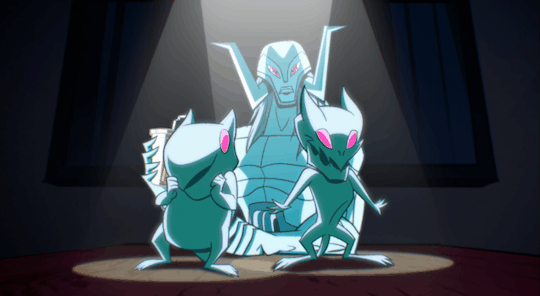
However, we also know that in the show, Raph is 15, Leo and Donnie are 14, and Mikey is 13.
But how is Raphie 15 years old when they were mutated 13 years ago? Logically, that means that Raph was a 2-year-old turtle on Mutation Day. Similarly, Mikey had just recently hatched.
So when Raph says…
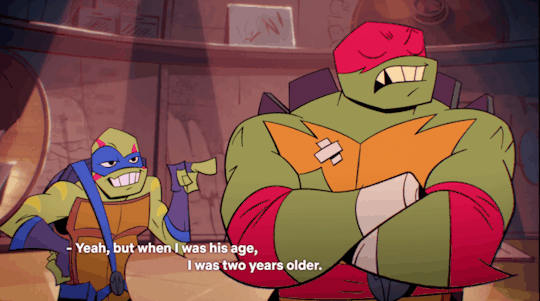
Technically...he's right.
#That still doesn't mean it makes sense in context though#Raph math#it's mathin#starkiss ramblings#rise analysis#rottmnt analysis#character analysis#Raphael Ramblings#rise raph#rise raphael#raphael#rottmnt raphael#raphael hamato#rottmnt#tmnt#teenage mutant ninja turtles#rise of the teenage mutant ninja turtles#rise of the tmnt#tmnt2018#tmnt 2k18#tmnt 2018#save rottmnt#unpause rottmnt#unpause rise of the tmnt#save rise of the tmnt#save rise of the teenage mutant ninja turtles
764 notes
·
View notes
Text
saw someone on twitter point out how at the start of DRs2, lloyd's visions would take place in an empty landscape and are mostly symbolic, being just simple reminders of what might happen. but as the blood moon gets closer, his visions take place in actual places, and are more literal than the previous visions




but then, we also see how some of his visions in episode 10 once again take place in that empty landscape, probably meaning how they are further away and won't possibly happen until a while later




so, this could indicate that if the visions are in an empty landscape, and are more symbolic and simple, then that means that the vision won't take place until much later on. meanwhile the visions that take place at real locations and are more literal (and intense), those visions are close, and what might happen will happen soon
#ninjago#ninjago dragons rising#ninjago lloyd#levi's analysis#levi's ted talks#this is such a cool detail bro 😭#now with this context I gotta analyze what the beatrix nokt and motion EP10 visions might mean SGDDGSHD#I already have ideas
181 notes
·
View notes
Text
TL asleep? cool.
(long post, strap in)
i wanna talk about colin's wet dream. that was the most demisexual shit i have EVER seen. there's not even any sex. its just a romanticized, elevated version of their first kiss. its colin's subconscious wanting to replay the moment he fell in love with his best friend in the Most way possible.
lets break it down:
we got the same location of their first kiss. Complete with mood lighting and a fog machine. It’s giving pride and prejudice 2005
Penelope comes out (looking gorgeous, of course) to their rendezvous spot, which has been previously agreed on.
colin thanks her for meeting him, she doesn't know why he's asked her to come
he confesses his feelings for her
she reciprocates (this is the important part of this to me. ) her wanting him, makes him want her more (do you see where the demisexual colin energy is coming from? do you understand?)
they make out
he kisses her neck as she pants his name over and over (see my point above re: her wanting him makes him want her more)
he wakes up, absolutely shook
this is an idealized reimagining for colin: during their first kiss he was basically in shock, his new personality chokes on the reality and vulnerability of the moment
in the book he talks about how he tries to think of something witty to say but finds that no words are necessary, and there's no combination of witty banter or suave bravado that could help in that moment. the rake persona that he has put on up to this point absolutely fails him. but here, in this dream, words are crucial, the declarations of love are why its sexy! (demi colin is canon idc idc)
and its so important that this wet dream, the idealized version of this scenario happens like this. because we've also seen colin having sex with sex workers (and luke newton has talked about this) but his energy in those scenes is very detached, very focused on him and his pleasure with zero connection to the women he's with. he has two different threesomes (if you can even call the second one that, he's barely even looking at them) with four different women and we know nothing about these girls. they don't even get names. they don't matter, and its simply not. as. good. as the feeling of kissing pen. there is no connection
which is, i think, why he taps out during the threesome in ep4. he tries to go back to the devil-may-care attitude toward sex and intimacy that he had before kissing pen, he tries to return to that mask he put on of "the rake" and it just doesn't work! he feels nothing! in fact he feels disdain for the position he's in and the choices he's made!
the threesome in ep4 mirrors the outburst he has later at the club really well. like he's so frustrated with this position he's put himself in, the men he's surrounded himself with. he literally says "none of you are gentlemen!" "you're actually gross and disrespectful!"
a line that i love is :
"... it is tiring, is it not? The necessity imposed on us to remain cavalier about the one thing in life that holds genuine meaning. Do you not find it lonely?"
and they laugh! in! his! face! because these are men that feel perfectly fine sleeping with strangers and bragging about their "conquests" to their buddies
but that is not who colin is! he's still very young. and his experience with marina (who tried to seduce him and it didn't work, imo bc he just didn't feel that passion, that love that makes his relationship with penelope so different) has left him jaded, but not nearly as jaded as he wants to believe. even if he wants to be casual about romance and sex, he just isn't. this man proposed to marina after knowing her for what? a couple weeks? He is an All or Nothing type of guy. He has that Bridgerton 'when i fall in love i will only ever talk about my spouse' Gene
Now: some costuming details that i love:
Her hair:
(i know this is a stretch but go with me here) her hair is in slightly tighter curls than we've seen this season, which to me seems like a nod to colin liking (or at least not minding) her hair the way it was in previous seasons and maybe not caring as much as we might think about her transformation. but its still down and flowy and in line with her new style

let's talk about this! dress! (it has genuinely been keeping me up at night)
the sleeves seem much more similar to the silhouettes of her costumes in previous seasons, not necessarily in shape but in style
the sleeves are bulkier, compared to this season's costumes, which while they might have been the same size and shape, they are made of much lighter material, giving the silhouette a softer, more mature feeling.
compare it to this dress from s3 ep2: it looks very similar with the sleeve shape and the floral appliqués, but in the dress in the image above, the appliqués are much more obvious, closer to penelope's style under her mother's tastes
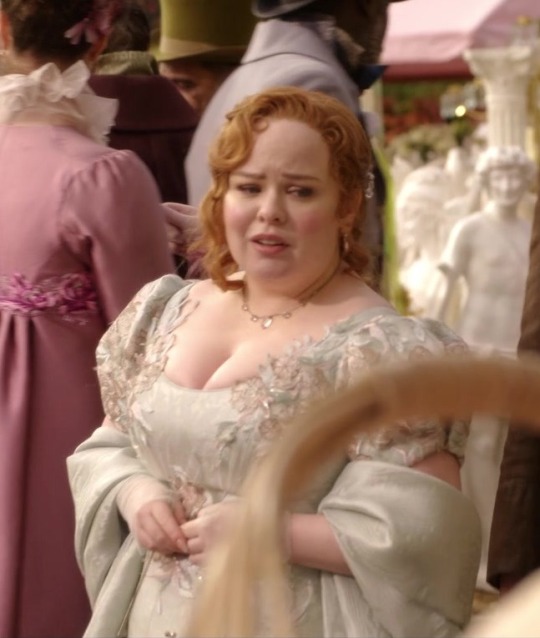
the point i'm trying to make here will be made more clear in a sec. what I am NOT trying to say that colin prefers her in her little girl dresses with loud designs, bright colors, and silly hairdos. he just associates those bigger, brighter, louder style choices with penelope.
And he has always liked Penelope. Even when he didn’t take her seriously as a potential partner, he always saw her as an equal. He never made fun of her silly dresses and questionable hair choices.
This has nothing to do with Colin but i feel like i should point it out:
there is something to be said about how her muted pastel color palette along with the more demure style that she has adopted shows that she is trying to Show Up with this social season, but as a wallflower, she is shy. she's always hated those brightly colored dresses her mother put her in, because no matter how close to the wall she clung, she was always visible. she was always vulnerable to ridicule.
but i don't think colin knows or realizes this because why would he think critically about the specific style changes she's made. and he probably doesn't really make the connection of the influence her mother has on her clothing. and around him, pen has never seemed all that shy. she's been confident and witty. if you pair her personality that shines around colin with her louder outfits, it seems more congruous
(take the scene from season 2 where we get the line "My purpose shall set me free") this is a side of penelope that no one, not even eloise!, sees
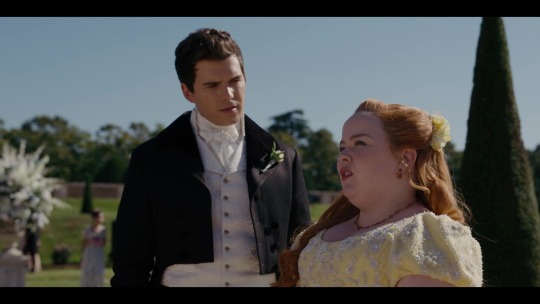
what his subconscious knows is that he associates pen with vibrant, textured, and often 3-dimensional outfits, and his subconscious creates a dress that fits her new style, with a little more of that featherington flair thrown in.
the fucking tie in front: i feel like this is a very clear reference/ foreshadowing to the mirror scene
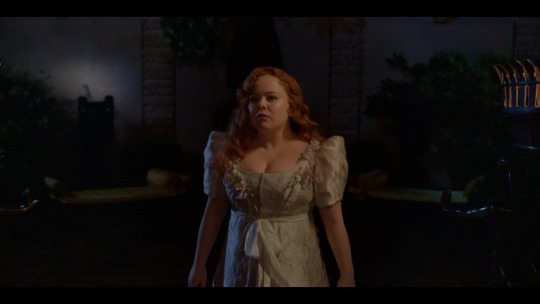
for those of you who haven't read the book, the mirror scene doesn't actually happen, but colin tells penelope about a fantasy he has about touching her in front of a mirror
this is a pretty small offhand comment made while they're having sex for the first time but amongst book fans the scene has become pretty fleshed out i think, with fanfics especially
because the idea that it touches on is colin fantasizing about penelope seeing herself the way he does, as sexy and desirable (he seriously cares about her pleasure so much its sickening, I'm actually sick)
and although Book Colin doesn't mention it, the idea of him undressing her in front of a mirror has become a popular story set-up
i think the tie in the front sort of plays on the time period sensibilities of propriety: this is a time where in "good" society an unmarried man and woman would never touch skin to skin, its why all the women wear gloves most of the time. its why the scenes in season 1 between daphne and simon play on the excitement of removing the gloves: its a taboo thing
this is unrelated to this post but i need an explanation as to why pen isn't wearing gloves in a lot of her scenes this season, like the scandal that that would cause??? I'm assuming its representative of her growing into her sexuality; and bridgerton is a fantasy, not a historical nonfiction, but like some consistency would be nice guys bc i was so confused abt all the skin-on-skin contact happening. even with Francesca and Lord Samadani WHEN HE KISSES HER BARE HAND I WAS SO UNCOMFORTABLE FOR HER. especially because of all the glove-related tension in s1. but i digress.
so the tie in front is sort of a dare. even though its clearly an addition, and untying wouldn't actually remove her dress, its her (colin's subconscious version of her anyway) way of saying: "you could untie this, you could undress me if you wanted to" "i love you" "i want you"
and i think that's beautiful. this season is great and i will die on this hill.
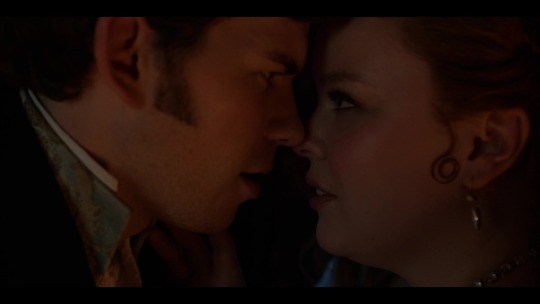
If you've made it this far, congrats! you're just as feral as me! come and gnaw on the drywall with me while i post fanfics inspired by this season: https://archiveofourown.org/works/55988977/chapters/142190584
chapters 1+2 of my new fic are up
photos are from : https://www.cap-that.com/bridgerton/302/index.php?image=bridgerton3x02_1502.jpg
#colin bridgerton#bridgerton#bridgerton spoilers#penelope featherington coded#polin#bridgerton season 3#bridgerton s3#bridgerton meta#costume design#demisexuality#demisexual representation#demisexual colin bridgerton#bridgerton season 3 analysis#romancing mister bridgerton#romancing mr. bridgerton#adaptation analysis#some historical context analysis as a treat for me specifically
239 notes
·
View notes
Text
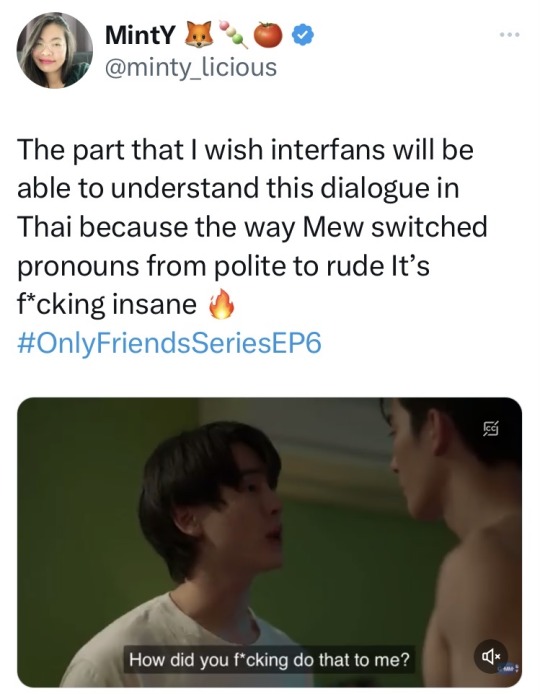
I was pretty curious to see what Thai reactions to this part would be. The reactions were wide in range. Some people not reacting or just going quiet, but these reactions were more— well, you could see the wince.
Mew & Top have used rao and each other’s names as pronouns since their first official meeting when Boston introduced Top to everyone in episode 1. During their first unoffical meet, Top uses pom.
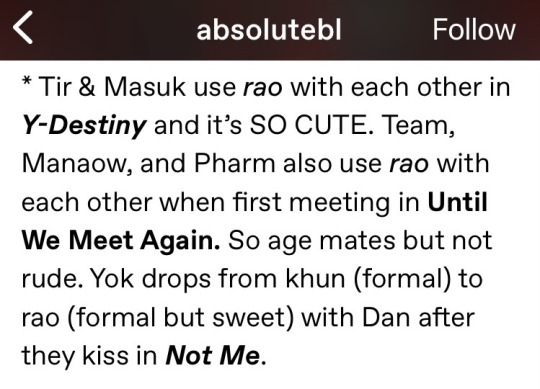
Cheum & April also use rao and each other's names as pronouns for reference.


Mew switching pronouns is SIGNIFICANT. It shows he’s really angry.
Top’s reaction immediately afterwards
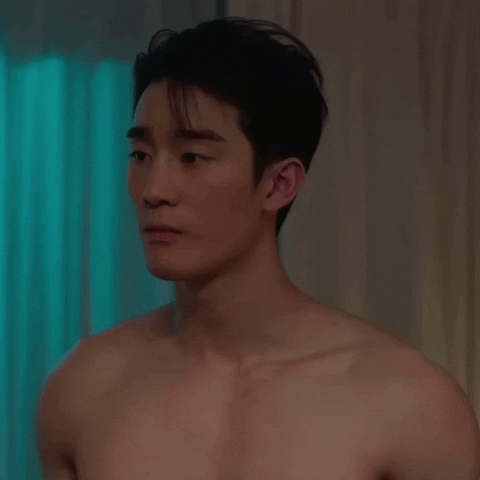
cr: tweet, reactions 1, 2, 3, 4, absolute bl post
#topmew#am i becoming nick? i had to watch this so many times to make this video#check my rb for more info#only friends the series#ofts#ofts analysis#have a terrible gif#only friends mew#only friends top#top tanin#forcebook#ofts context
774 notes
·
View notes
Text

Let this be a living example that knowing the beliefs of any individual who wrote any piece of text- be it literature, articles, or posts- can and should drastically alter your perception on what the text is actually communicating, even if that knowledge has, on its face, changed none of the actual printed words. This is how application of real-world context works, and this is how it applies to any recorded medium.
It reminds me heavily of a quote from video essayist Jacob Geller, regarding the 1938 film Olympia- "It's different when Nazis do it".
Olympia is a film that, on its face, simply depicts an artistic documentation of the 1936 Berlin Olympics. But within the context of its production taking place during the Nazi regime, with its director being a well known Nazi propagandist... The way the movie fixates on the power and elegance of the human form and Ancient Greek statues quickly shifts from being completely innocuous appreciation to the worship of what is perceived as the ideal forms of the "Aryan race". Suddenly, you understand the movie not to be a pretty inoffensive documentation of a historical event, but a propaganda piece.
Understanding the time period in which something was made, as well as the setting it was produced in/for, and whatever ideologies an artist may hold and experiences they've had is absolutely critical to getting a full understanding of anyone's work. There are some things that are near completely anodyne on their face, but the revelation of what the author thinks and feels about other people and the world around them totally redefines every word on the page.
This image is such a prime example of why context matters. This opinion, laid bare, stripped of context, is both inoffensive and nonsensical. No one's ever thought it to be lame to create your own nickname... But on its own, that's a harmless kind of wrong.
... But with the addition of them being marked as Anti-Trans (red) on Shinigami Eyes, a browser extension dedicated to crowdsourcing keeping track of Trans Friendly and Transphobic creators... Suddenly, "Nicknames" doesn't mean "Nicknames" anymore. Suddenly, you realize that "Nicknames" is code for "Chosen Names of Trans People". Suddenly this isn't about thinking choosing your own nickname is lame, this is about thinking that trans people shouldn't have the right to name themselves. Suddenly it's about invalidating identities, thinking they're worth mocking. Thinking that people who identify as trans are "just trying to be cool", and that they're not actually what they say they are, because you don't get to choose your gender nickname, that's something already decided for you.
Suddenly, you realize, it's not about "being lame".
It's about Transphobic Violence.
This is why you cannot ignore when an artist, author, essayist, developer, musician- so on and so forth- is bigoted. This is why you can't ignore the context behind their upbringing. This is why you can't ignore the context behind their lived experience, their ideals, their goals, their message. Yes, it may appear innocent on its face. Yes, it may look fine stripped from the context of it being written by an inevitably flawed human being. But what's really being said here? What do those words mean... To the one who wrote them?
Context redefines Text.
Even if the words didn't change.
#this post is a bit random. not apologizing. it was just such a perfect encapsulation#i am still tagging this as homestuck because this is ultimately EXACTLY how i feel about hussie + their works. you must understand this.#its so applicable to hussie + homestuck + analysis of homestuck that it is fucking painful. PLEASE understand this. PLEASEEEE#homestuck#homestuck meta#homestuck analysis#andrew hussie#context#literary analysis#essay writing#cw nazi#cw transphobia#nekro.pdf#nekro.txt
1K notes
·
View notes
Text
idk but a part of me gets annoyed whenever people compare dr ratio and alhaitham.
like yeah ok... hot buff autistic nerdy men
but their whole ideologies are completelyyy different
would alhaitham ask you to give him a 'stimulating quiz' in his free time and then proceed to design a weapon for the express even though he didnt need to? no.
would dr ratio complain about becoming the (acting) grand sage and lead sumeru? no??
alhaitham is a 'live and let live' kind of guy. he justs wants to chill and have an easy life. like be for real, he's so worried about the akademiya finding out about his true talents and power because he hates the idea of working more. the only reason he's the scribe is because it's easy and it pays well. he's not particularly interested in helping others out unless its beneficial to him or the other really needs it. as kaveh said(i think he did??? idk i dont play genshin anymore), alhaitham is a nihilist
dr ratio on the other hand? he craves being able to fix things. all he wants to do fix things. although yeah he's not gonna do everything for you, he literally said to your face that if somethings bothering you deal with it yourself BUT he did literally go out of his way to scheme that entire thing in his quest to bring the people on the space station to there senses and get them thinking for themselves instead of obsessing over those geniuses. and that whole speech he gave to screwlum after? bro was INVESTED AND INTENSELY PASSIONATE. hes extremely passionate about getting people do use and develop their talents to the best of their ability. hes a fucking doctor who somehow has 52 courses and any of the people who actually make it through all get far in their lives. alhaitham would never put in that effort even with all his talent and ngl dr ratio would hate him for that (maybe not hate but dislike).
Another difference? alhaitham isnt a bitch about what his talents although its easy to assume he is while ratio low key kind of is and since the game itself describes him as 'narcisistic' so i think its pretty safe to assume he acts a bitch and he kind of is one too (cant blame him if i did all he did i would be the same)
#oh and the aventurine and kaveh comparision just kind of... confuses me.#like i guess i could get it in the context of aventio and kavetham but only then#does this count as a character analysis??#dr ratio#hsr dr ratio#veritas ratio#babbles#hsr#honkai star rail#star rail#genshin impact#genshin#gi#alhaitham#gi alhaitham
282 notes
·
View notes
Text
[A sad violin song plays over an image of a sad hamster]
Pac: This doesn't have anything to do with me – I wear a blue sweatshirt, you're crazy, this mouse doesn't even have a sweatshirt, this hamster! [Reading chat] Am I a depressed hamster?

[ Transcript continued ↓ ]*
–
Pac: Actually– that's fine! I embrace that idea – of course I'm going to be depressed, are you crazy? [He hits his desk, then starts counting off people on his fingers] Fit is gone, Richarlyson is gone, Ramon is gone, Bagi and Empanada who were always there when we were there are also gone, I haven't seen them! It's just me and Tubbo, and sometimes Philza shows up.
Pac: I lost Chume Labs, I lost the Favela, I lost Murder Mystery, I lost Ilha Chume Labs, it's crazy! Look at how much I've lost, and I've gained nothing! Of course I'm going to be depressed, are you crazy?! How am I supposed to be happy?!
Pac: [Reading chat] "You have us Pac," that's true, thank you. No, that's true, sorry.
* NOTE: Please note that this is an incomplete transcript, as I was primarily relying on Aypierre's translation mod at the time and if I am not confident of the translation, I do not include it. As always, please feel free to add on translations or message me corrections.
#Pactw#QSMP#Pac#March 18 2024#As much as I love keeping people updated about Pac / the other Portuguese-speaking creators#I think I might not make as many transcribed posts for their clips anymore#I just don't think I'm qualified enough to be transcribing things for a language I don't know#like yeah we have the Qlobal Translator and Aypierre's translators to rely on#And I'm always upfront when I'm not 100% sure about a translation#but I've been thinking about it a lot and it kinda makes me feel a bit icky. Idk.#I might be overthinking this but I just I don't want to spread around translations I'm not super confident about#esp. since I know a lot of people cite my clips in analysis posts or link them to other people as resources#and 90% of the time I'm like ''Hell yeah I love seeing people getting a lot of use out of the archive''#but sometimes I get a bit anxious like ''Did I do a good enough job translating this''#''Am I ruining someone's entire perception of a conversation or character because I left one word out or mistranslated something?''#And like I said that's normally not a HUGE concern since if I'm not certain about a translation I just won't post a clip. but you know#idk it might just be the anxiety talking but I really really don't want to spread bad info#Happy to hear other folks' perspective#I'm really grateful for people like Bell and Pix and others who translate clips and I always try to reblog those#but we don't have a ton of people posting clips & translating things on Tumblr since we're so English-centric#which is part of the reason WHY I like sharing clips of the non-English-speaking CCs#but at the same time I want to do an accurate job representing what they're saying#Maybe I'll just start posting things and give a TLDR context of what they're talking about but not a transcript#that way native-speakers can hop in and add translations if that's something they're comfortable doing#and if not then well. at least I'm not sharing something that isn't super accurate#idk I'm just thinking out loud a bit in the tags#But I'm open to hearing other people's thoughts on the matter#Anyways giant rant aside. q!Pac is NOT doing ok rn
252 notes
·
View notes
Text
Hey, so, a while back I made a revelation, and I’m finally posting about it on Tumblr because I continue to have A Few Goddamn Questions.
Alright. So I want everyone here to take a good hard look at Joronia/Spider Sectonia. Something you might notice about her design is that she’s pretty clearly wearing clothes. And like… of course she is— why wouldn’t she? She’s more or less a mirror of Taranza’s design, and he’s wearing clothes, so she is too.


But… Sectonia. The Sectonia WE know. The final boss you defeat at the end of the video game… while she has design elements that evoke the image of clothing, seemingly only the collar, the crown, the gloves and maybe the sleeves are actual clothing. Everything else is just her body.
Which wouldn’t be all that noteworthy if she were a standalone design. Plenty of characters in Kirby, including Kirby himself, don’t wear clothes! I’m certainly not going to point at Marx and accuse his practically running around butt-naked of being weird, but in the context of the fact that Sectonia used to wear clothes?
It kind of makes it feel like she stripped for no discernible reason following her descent into villainy, and that’s really, REALLY funny.
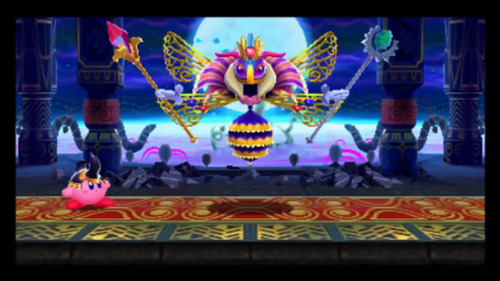
GIRL! PUT YOUR SHIRT BACK ON!!! THERE ARE STRANGERS IN YOUR HOUSE.
#kirby#sectonia#queen sectonia#to be clear this isn’t a super serious burning question i have in a scholarly context#i know the answer is ‘it’s a video game. it’s not that deep. it’s not weird she’s not wearing clothes.’#i simply think it’s a super funny observation#and thought it would be even funnier to word it as if i were about to go into some meta-analysis#kirby of the stars#hoshii no kaabii#hoshiii no kirby
235 notes
·
View notes
Text
"While largely toothless as a democratic body—shorn of true legislative capacities and having never developed a genuine transnational dynamic—the European Parliament is nonetheless an important bellwether to track the continent’s political winds. As the results of the parliament’s June 6-9 elections confirm, those winds are blowing in a bleakly reactionary direction.
... There are two principal causes for this. First, the fact that for many decades now European national governments and federal European institutions have legitimized — through emergency measures, moral panics and murderous border policies that have led to thousands of migrant deaths in the Mediterranean — the far Right’s defining claim that migration threatens the material and cultural survival of white European civilization. The far Right’s obsessive talk of borders and births, and its promotion of the myth of the Great Replacement, were enabled by the EU’s political center. Governments across the continent advanced anti-migrant policies on the grounds that stricter regulations would sap the foundations of extremism. But it turns out voters often prefer the original brand, choosing bellicose nativism over technocratic repression when it comes to the 'migration crisis.'
The second engine of Europe’s turn towards authoritarianism is the EU’s promotion of fiscal austerity policies that have particularly impacted Southern Europe and Ireland, but which have led to welfare state retrenchment across the board. Beyond eroding livelihoods and exacerbating inequality, austerity also led to the rise of multiple movements to reclaim national sovereignty, almost all of which (after the punishment and capitulation of Syriza’s left-wing government in Greece) are now monopolized by reactionaries. While all of Europe’s far-right parties have played on this supposedly populist register, none have challenged the hegemony of markets and the rating agencies that dictate cuts to social programs.
... The real social malaise that plagues so much of Europe — overburdened and privatized healthcare, labor precarity, anemic social security, accelerating climate-related emergencies — is projected onto the far Right’s favorite scapegoats: primarily migrants, but also 'gender ideology' and its alleged assault on the family as Europe’s moral and material core."
#if u remember I said I was waiting for an article with actual context and analysis to post about this#here's one finally#imperialism
121 notes
·
View notes
Text
I'm writing an analysis of gender performativity in The Silence of the Lambs for my gender and sexuality class and in the course of my research I have encountered so many bad takes!! I can't not say anything so I've come to Tumblr to rant.
The most common criticism I see is that the ending of "Hannibal" discredits, undoes, or diminishes Clarice's feminism, autonomy, or power, or that it ruins the message of SOTL. That indicates a complete misunderstanding of Clarice and the point of the books! The point of "Hannibal" is to show that it does not matter how amazing, powerful, or how much of a feminist you are: if you are a woman in a career, especially a federal career, the system is designed to put you down and keep you quiet. I think there is nothing more she could have done and nothing she could have done differently to prevent her disgrace. When the system is set up to put men in power and keep them in power, your talent and integrity do not matter if they decide they don't want/need you anymore. There is nothing she can do to prevent the label of "female officer" from haunting her credibility. Even Crawford, who respects her and fights for her, sees her with the caveat of "woman." The one man who does not consider her gender any sort of detriment or a reason to treat her differently is Hannibal Lecter. They have genuine mutual respect. When she chose to be with him, she chose respect, love, and comfort over a life of fighting to be recognized, respected, or listened to. Just as much as it is respectable for women to fight for their right to be recognized in their careers, we must also recognize that that fight should not need to exist in the first place. So, why should there be any shame about choosing not to fight that fight anymore? She spent years in an uphill battle, and she probably never would have escaped it (to no fault of her own!). The ending of "Hannibal" is Clarice raising a middle finger to the system, the FBI, misogyny, and the patriarchy by recognizing that she deserves unconditional love and respect and that the system she fought so hard for was, in fact, completely undeserving of her talent or presence. Her decision is powerful and empowered!
"She was brainwashed!" she literally wasn't. Hannibal tried that (I believe because he was so unfamiliar with the idea of love or family that he didn't know how to understand Clarice outside of the lens of Mischa) but he was unsuccessful. If she was able to resist his efforts of brainwashing while in an altered state she certainly had the strength of mind to make her own decisions. Her decision was not impulsive. Also, I think it serves as a testament to her influence and power over him. She gained control of the situation and he didn't resist that. Ultimately, Clarice chose to spend the rest of her life with the one man who ever truly saw her as more than just a woman, who admired her intellect, and who respected her enough to challenge her. That is not weak, submissive, or misogynistic. Quite the opposite. She chose to leave behind the life she put years of effort into building (because she knew it would be fruitless) in favor of being finally honored and appreciated. That takes courage! She knew her worth, and she knew the FBI didn't deserve her.
Also, anyone who paid any attention to the books saw the romantic tension throughout the story. It didn't come out of nowhere. She really just needed an opportunity or an excuse to be with him, and she was finally presented with it.
I think reading the ending to "Hannibal" as anything other than empowering is a mischaracterization of both Clarice and Hannibal and shows a lack of understanding of the message of the books. I think it reflects a shallow understanding of not only the books, but of how feminism operates IRL (especially during the 80s/90s).
I also must give the disclaimer that I do not think these books are epitomes of feminism or representation. The transmisogyny, racism, queerphobia, etc., are obviously inexcusable. Just because I interpret their message as a story of caution about how misogyny operates, and how it is respectable to choose a path that does not work within that system, does not mean I agree with everything presented in them or any of their harmful rhetorics or stereotypes. I have a STRONG love/hate relationship with these stories and I don't ever mean to undersell the "hate" part of that lol.
#wanna talk about bad endings? lets talk about the hannibal MOVIE!#ok this post sounds a little bitchy but I'm not trying to be argumentative I'm just way too invested in this lol#the silence of the lambs#silence of the lambs#sotl#hannibal book#hannibal books#hannibal movie#thomas harris tetralogy#thomas harris books#thomas harris#clarice starling#sotl analysis#clannibal#clarice x hannibal#hannibal x clarice#I'm also peeved by the whole “breastfeeding kink ew weird” claim like cmon#that is the tamest kink ive ever heard of#in this context i find it kinda wholesome tbh
371 notes
·
View notes
Text
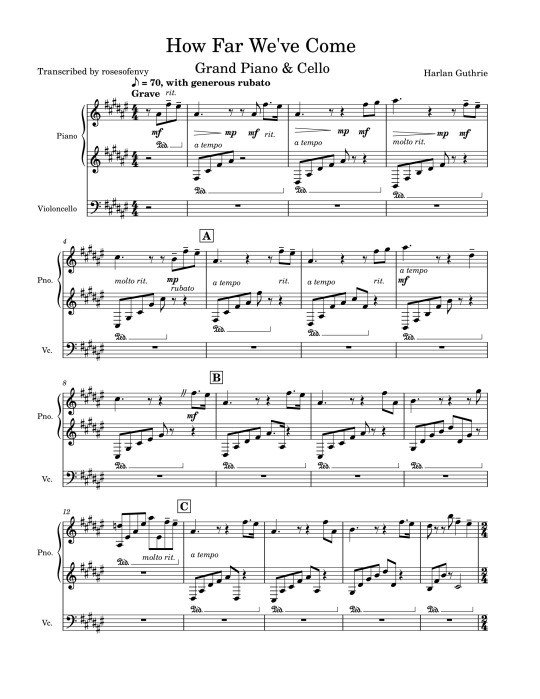

How Far We’ve Come - Music Theory Analysis
[Disclaimer: I went to university for music as a violin primary and have the most confidence with classical strings. I passed my piano proficiency courses, but that is the extent of my piano knowledge. It has been a few years since I have done an in-depth composition analysis of any piece, let alone transcribing a piece by ear and then analyzing it. Music theory has never been my strong suit! Please excuse any mistakes in notation, and any inaccuracies in my transcription or analysis. I did my best and this was purely for fun *shaky thumbs up*]
----------------------
'How Far We’ve Come' by Harlan Guthrie is a duet between Grand Piano and Cello. This piece opens with solo piano, either in a pickup measure or in a single measure of 2/4 before transitioning to 4/4 time in measure 2. Throughout its entirety there are many moments of rubato which have been notated as ritardando and a subsequent a tempo. To most accurately follow the phrasing, listening to the recording is highly recommended.
This piece begins in the key of F#M or the enharmonic spelling of GbM. Although unpleasant to look at with either 6 sharps or 6 flats, depending on which spelling is followed, this key is often used by composers to invoke emotions of a conquest story, evoking relief, triumph, victory, and clarity. As we know from our story in Malevolent so far, this meaning is not lost on us. I have chosen to keep this piece as F#M since that is how I originally began transcribing it. I have also attached the GbM version at the end of the post, however all the analysis follows F#M spelling.
The lone piano begins on the third of our I chord with a hesitant, heavily rubato 8th note pickup into measure 1. The transition from measure to measure in this first phrase gains little confidence, especially with the transition from the pickup into m. 1 as this is the only instance in the piece where the set of 8th notes in the left hand do not lend itself into the next right hand pickup (four 8th notes instead of five). Each lead-in to the downbeat is stretched, pedal held throughout the measure to allow the sound to linger. Each press of the keys is deliberate, yet maintains a mezzo dynamic as the sound fades. m.2 is introduced with a vi chord, creating a hint of unease before resolving in m.3 to a IV(add7). We end our first phrase with a half cadence to a V chord, leading into a V7 as our next phrase begins with a B.
As we enter our second phrase it is similar to our first with m.5 beginning with a I chord, m.6 expands our vi chord compared to its first iteration, resulting in a more confident feel as we continue into m.7 with yet another expansion to our IV(add7). M.8 ends this phrase as we reach another half cadence V chord almost V7.
Beginning m.9 the piece has a few possible paths of analysis, we arrive on a vi chord if we are remaining in F#M, which unlike our other initial starting phrases this throws us into a melancholic mood. There is a possibility of modulation to the relative minor (D#m), however I believe it remains in F#M and utilizes inversions of our chords and will continue with this assumption for the next phrase.
Remaining in F#M, m.10 could be a vi(4/2) inversion, or a I(6/4) inversion. Because Measure 11 moves to a ii chord, I believe it makes more harmonic sense for m.10 to be a vi(4/2) inversion as moving from a I(6/4) - ii is less common than a vi(6/4) to a ii.
M.11 into m.12 is a fascinating progression. We have a V with the (g) in m.11, then we are descending to a Dnat, A#, E# progression. The Dnat is what has thrown me off the most, as it is a minor chord of sorts but doesn’t exist within our key of F#M, or relative D#m. The E# A# progression I believe is a I(4/2) chord, as it is leading us back into the next phrase. Even spelling enharmonically as a A#, Cx, E# chord it does not naturally occur within our existing key. After many hours of checking theory textbooks, writing out possible modulations, and playthroughs of the chords, I’m choosing to leave this as a V-I(4/2) progression and accepting my loss that I do not know what chord exists in the downbeat of m.12. However, I can say that resolving to something that is not a root tonic further creates this sense of melancholy.
Bringing us to our next phrase at m.13, similar to our previous phrase a vi chord but instead of resolving to an A# it resolves to the root D#. M.14 is identical to m.10 with the exception of the lower octave A#3 before resolving in m.15 to a ii chord until the fourth beat of the measure which leads us into measure 16 - resolving to a IV-V half cadence by the end of the measure.
Reaching m.18 we are returning to our original phrase. This is where our cello enters for the duet, in which I have some observations about musicality first. As the piano is using a significant amount of pedal to sustain the sound, the cello utilizes a wide vibrato to create a warm sound. Notably, this doesn’t occur as significantly when entering with the lower notes. The cello is confident, encouraging the piano forward and maintaining a solid momentum even with the hesitance the piano has shown.
M.18 we begin on a I chord, supported by the cello playing a low F# as the root. In the pause between phrases, it's as if you can feel the performers breathing together before they move to m.19, our vi(add7) chord.
Measure 20 I have quite a bit to talk about. Stacked chord analysis is not my forte (pun intended). From what I could hear, there is a B1, F#2, B2, F#3 in the cello, while the piano continues with a IV(add7) chord. B1 is impossible to play on a cello with traditional tuning, in order to achieve this note they would have to tune their lowest string - their C string - down a half step. The chord B1/F#2/B2/F#3 is also impossible to play on a single instrument. If one cello tuned their C down to a B, then they could feasibly play the bottom chord, possibly the two B’s in octaves. It is possible for a cellist to play an F#/B/F# chord, however it would be uncomfortable and not result in a good tonality with it being a triple stop - but, the second cello could split the chord and play a different combination (F#2,B2 or B2,F#) with success. Other solutions to this could be having a double bass play the pedal B, as it would be within their ability on and remain in the correct octave, or having the piano cover the pedal B. This massive chord then resolves simply to a half cadence V chord in measure 21.
Entering our last section, m.22, we return to a phrase similar to the beginning, with a confident I chord. With each measure we go to a more traditional chord progression to a V-IV-V in measures 23, 24, and 25 respectively. In an exciting turn of events, we land on a I chord in our final measure. The first PAC in the entire piece, and yet, it doesn’t sound as if the piece is finished. Throughout its entirety, all the phrases have been a form of inauthentic cadence. We end on a Perfect Authentic Cadence, a V-I, it should sound resolved. And yet, it continues on. The notes ring, and if left on repeat (as I have done for this analysis), it makes sense for it to continue.
In conclusion, I believe this duet is in an general AABBAA format, with A being Major key tonality and B encompassing a minor key tonality. This piece is a conversation, it’s full of emotion and hesitance and is a fantastic representation of everything we’ve seen Arthur and John go through so far in the podcast. I can’t help but think of “I’ve come so far…and I have miles to go before I sleep” with this piece as a reflection of that. This composition is saying “Look, see how far we’ve come, what we’ve done to get here. How we’ve changed and grown.” All this to say, it’s an amazing story and an amazing composition. If you made it this far, I’m glad you came along in this musical journey with me and feel free to add anything I may have missed (or possibly mistaken).
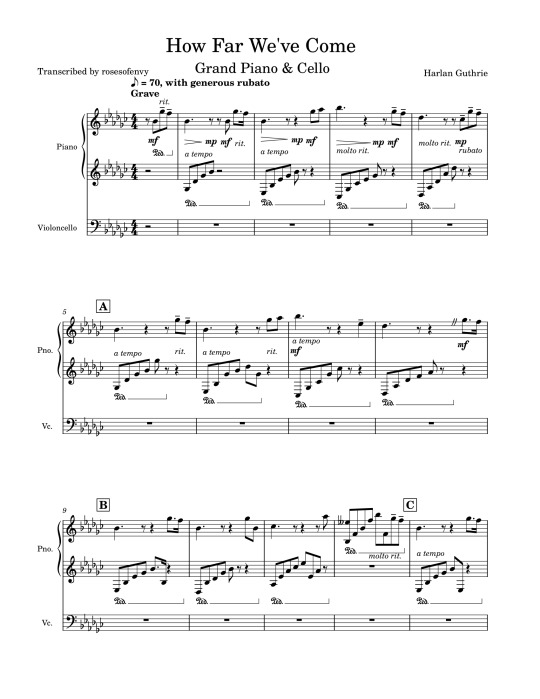

#malevolent#malevolent podcast#malevolent soundtrack#how far we've come#harlan guthrie#arthur lester#john doe#music theory#music theory analysis#piano#cello#I'm working on performing this but I only have access to a piano and cello once a week :'(#and I have so many other projects I've been working on *cries*#i spent a good week transcribing this#then a good two days analyzing it#my music theory chops are rusty#I was seriously pulling out my orchestration and harmony in context textbooks to check my facts#and i'm still worried i made mistakes askljdfhlsa#take all of this with a grain of salt!!!#envy writes
90 notes
·
View notes